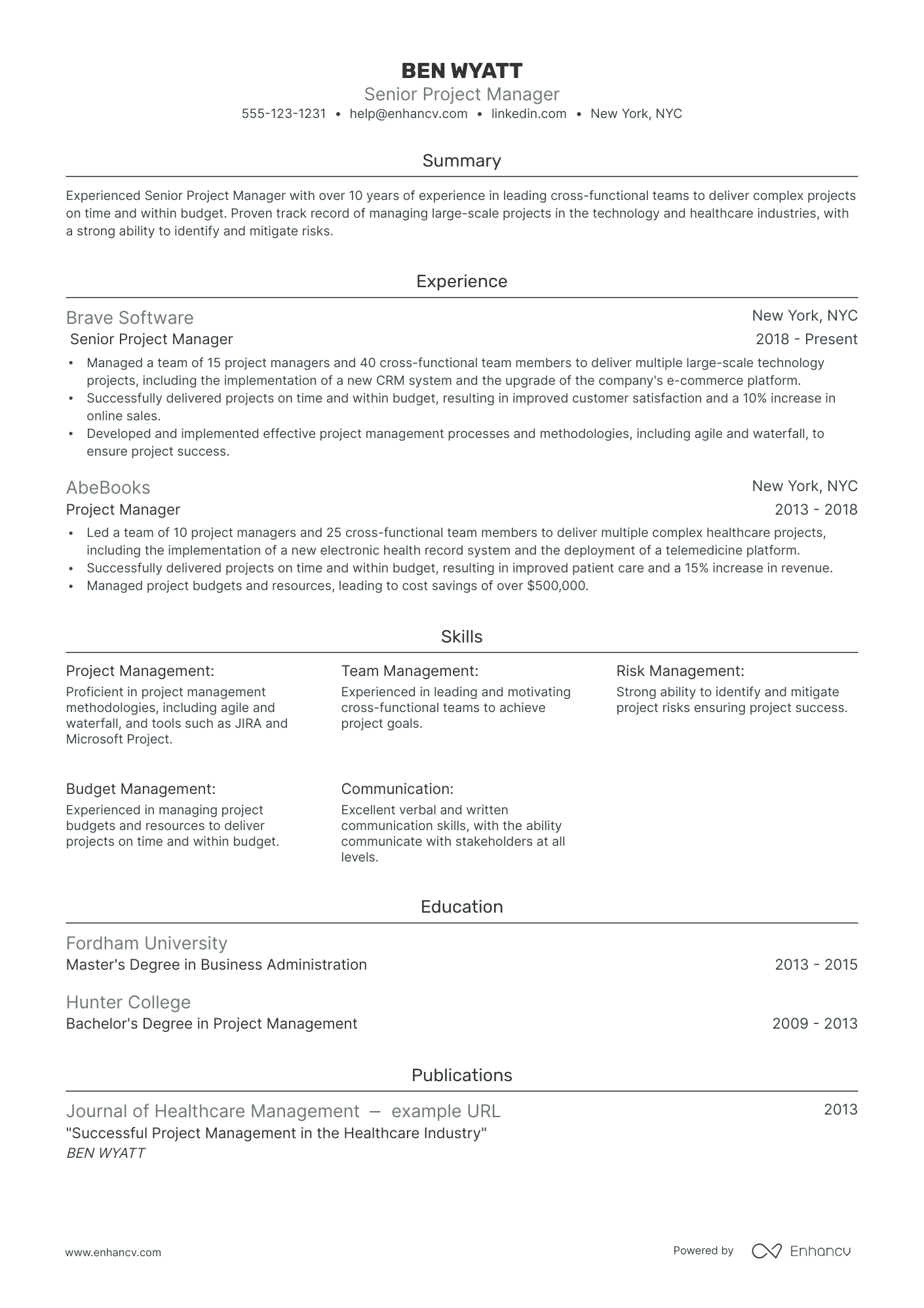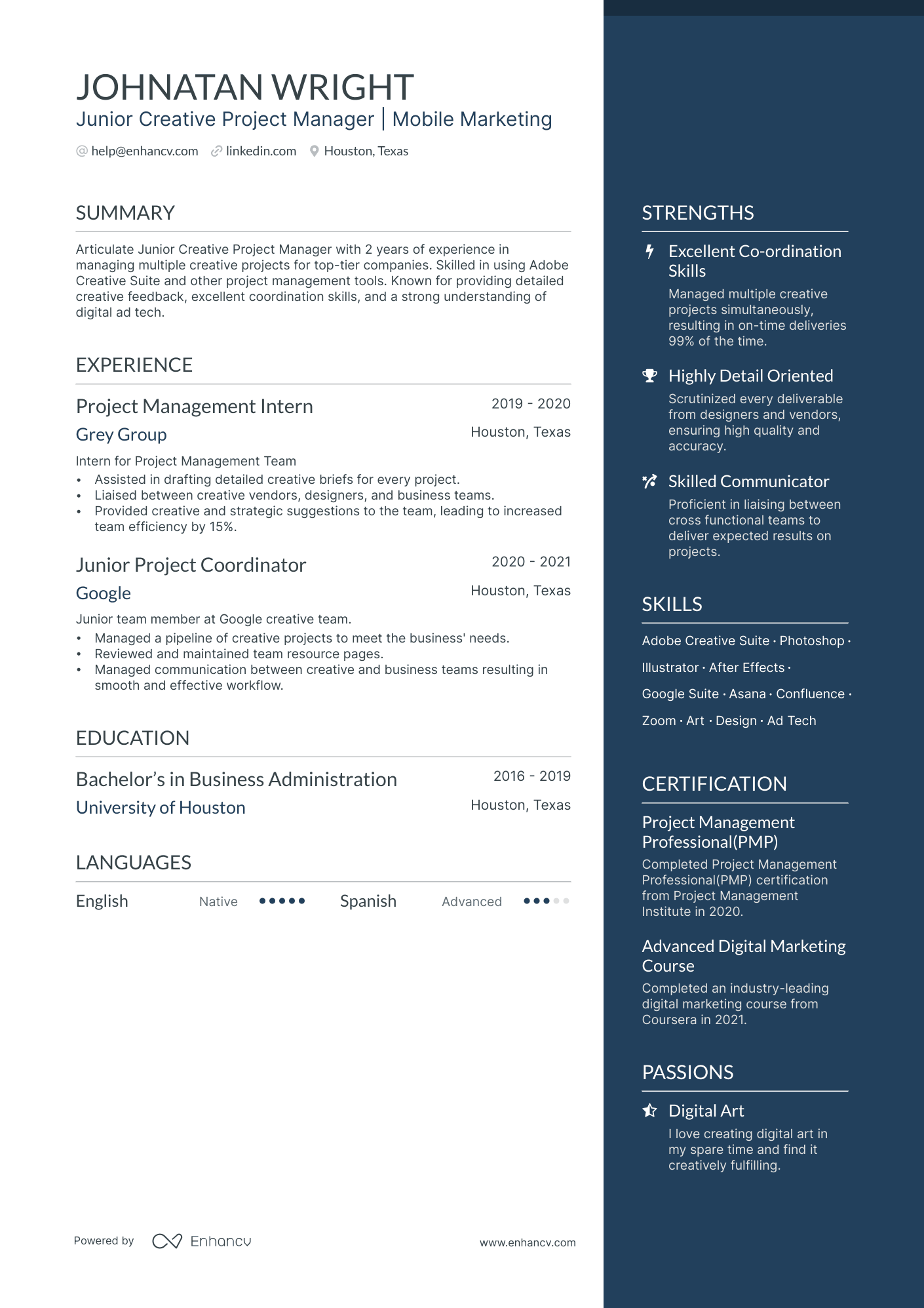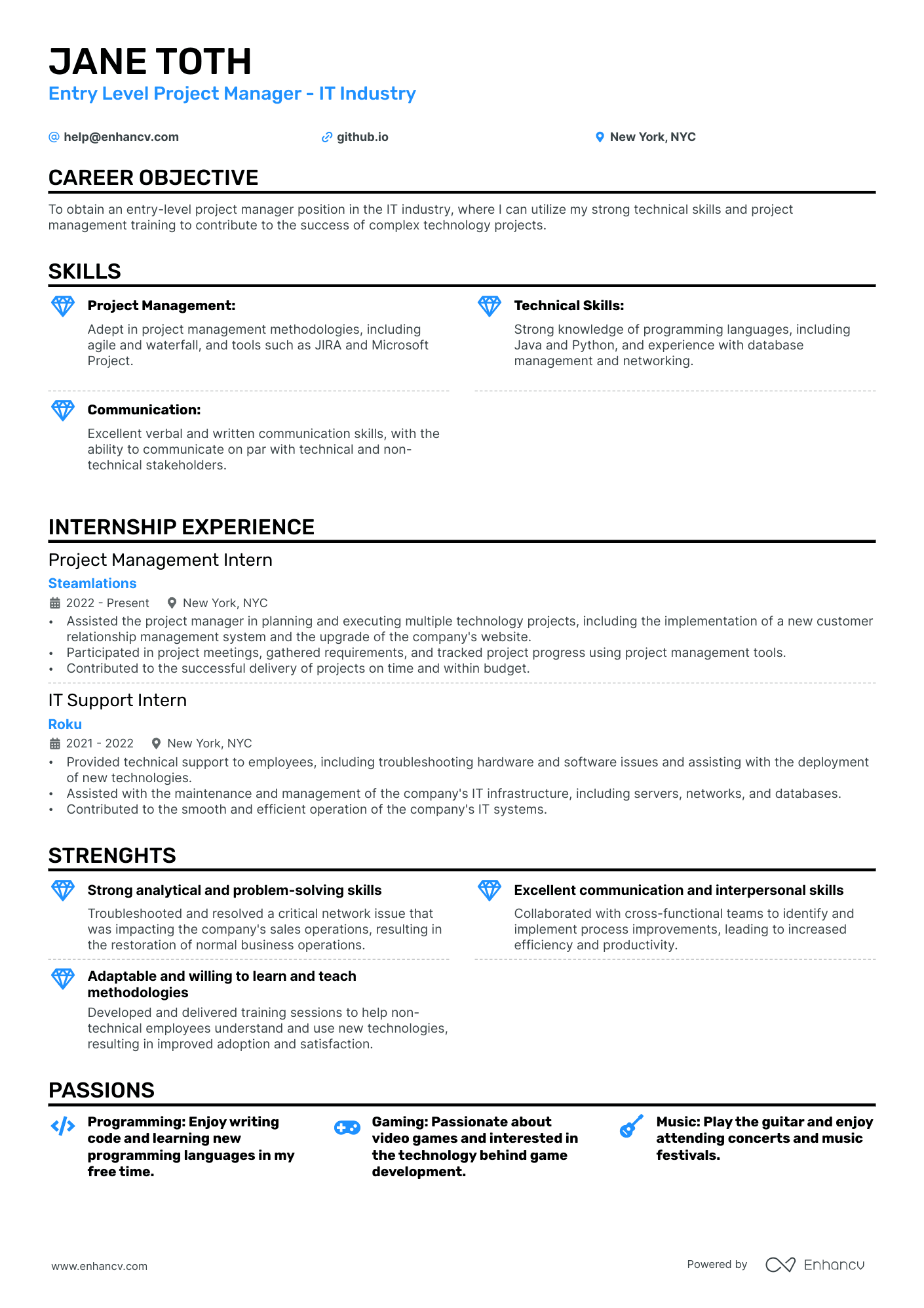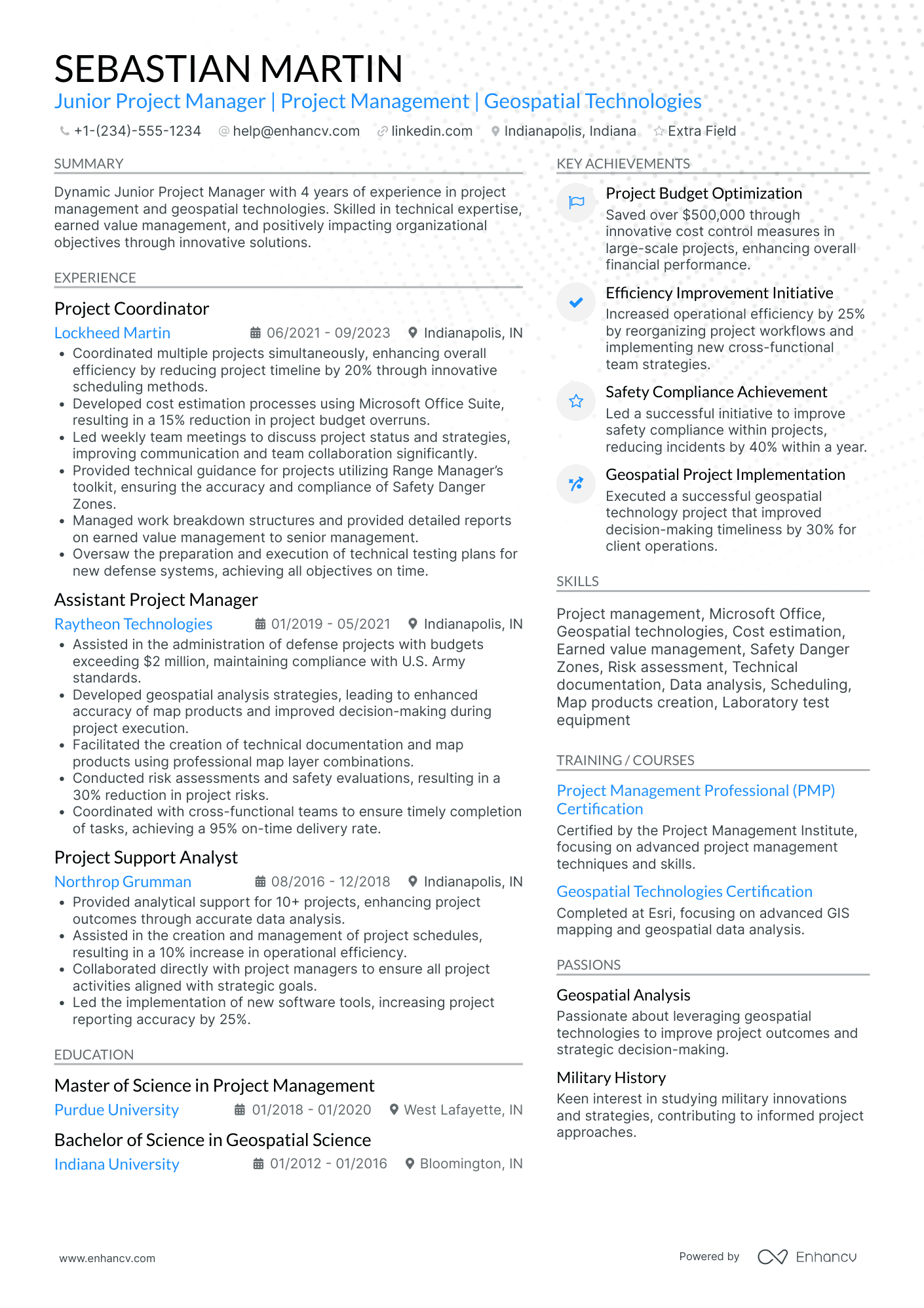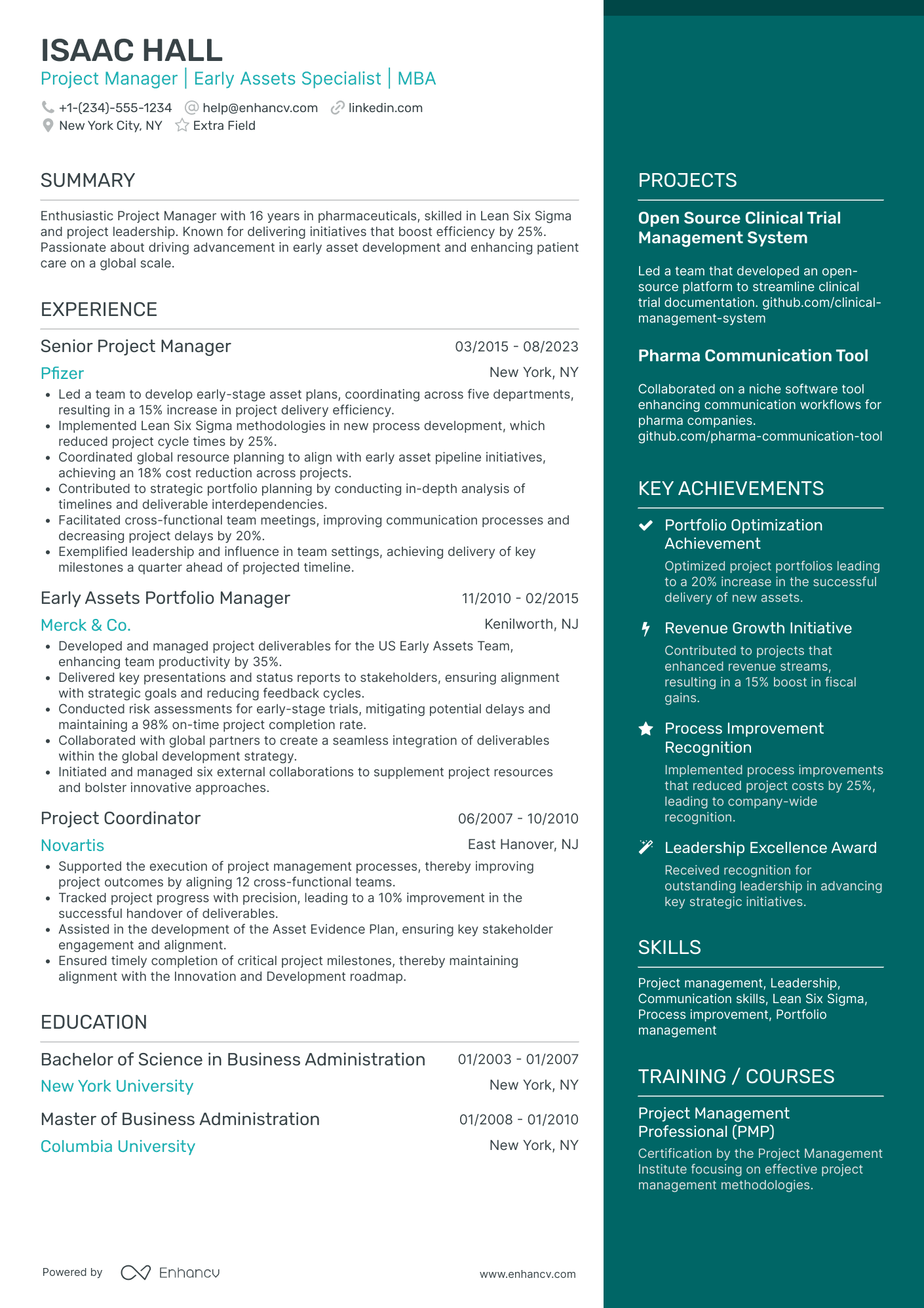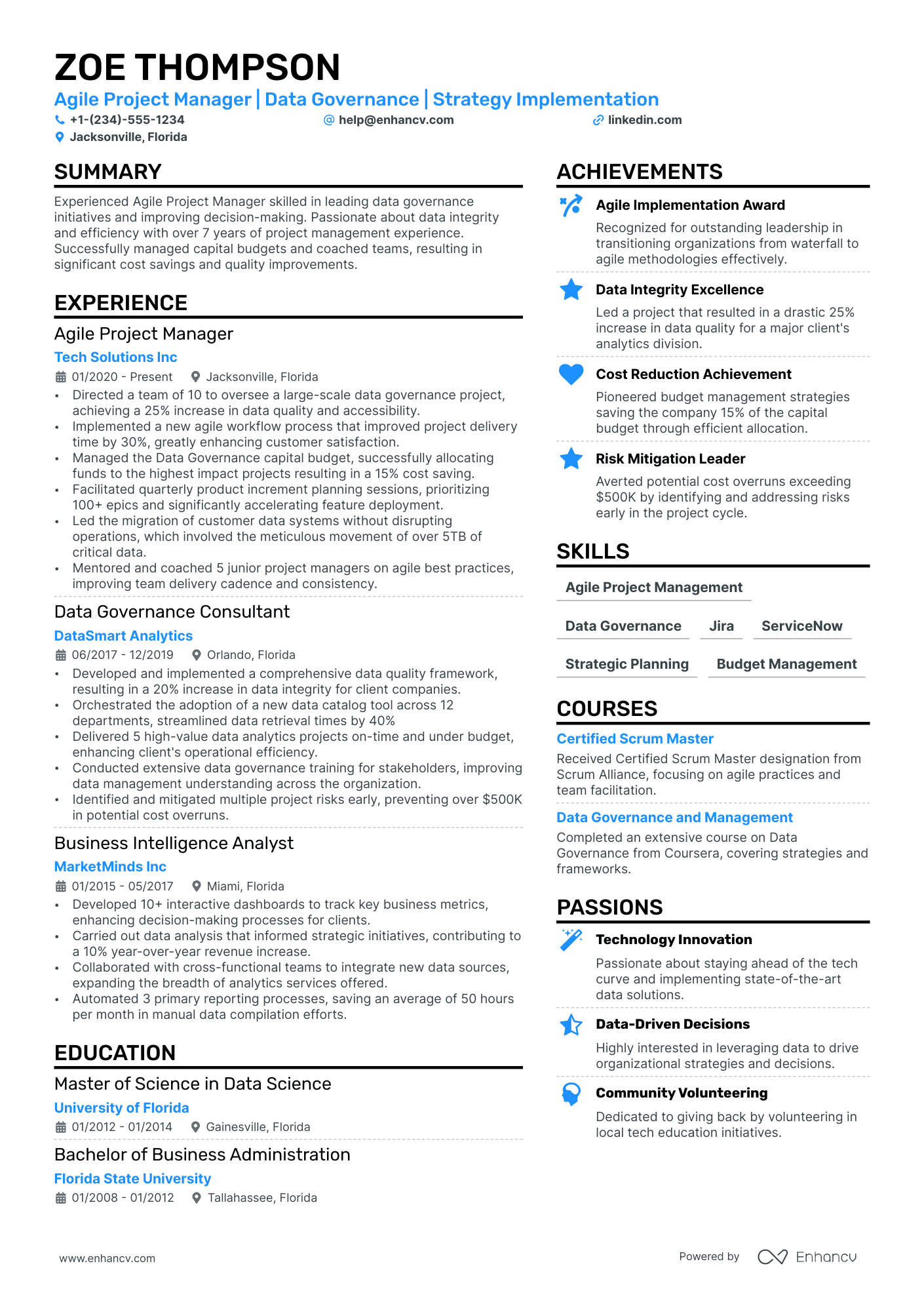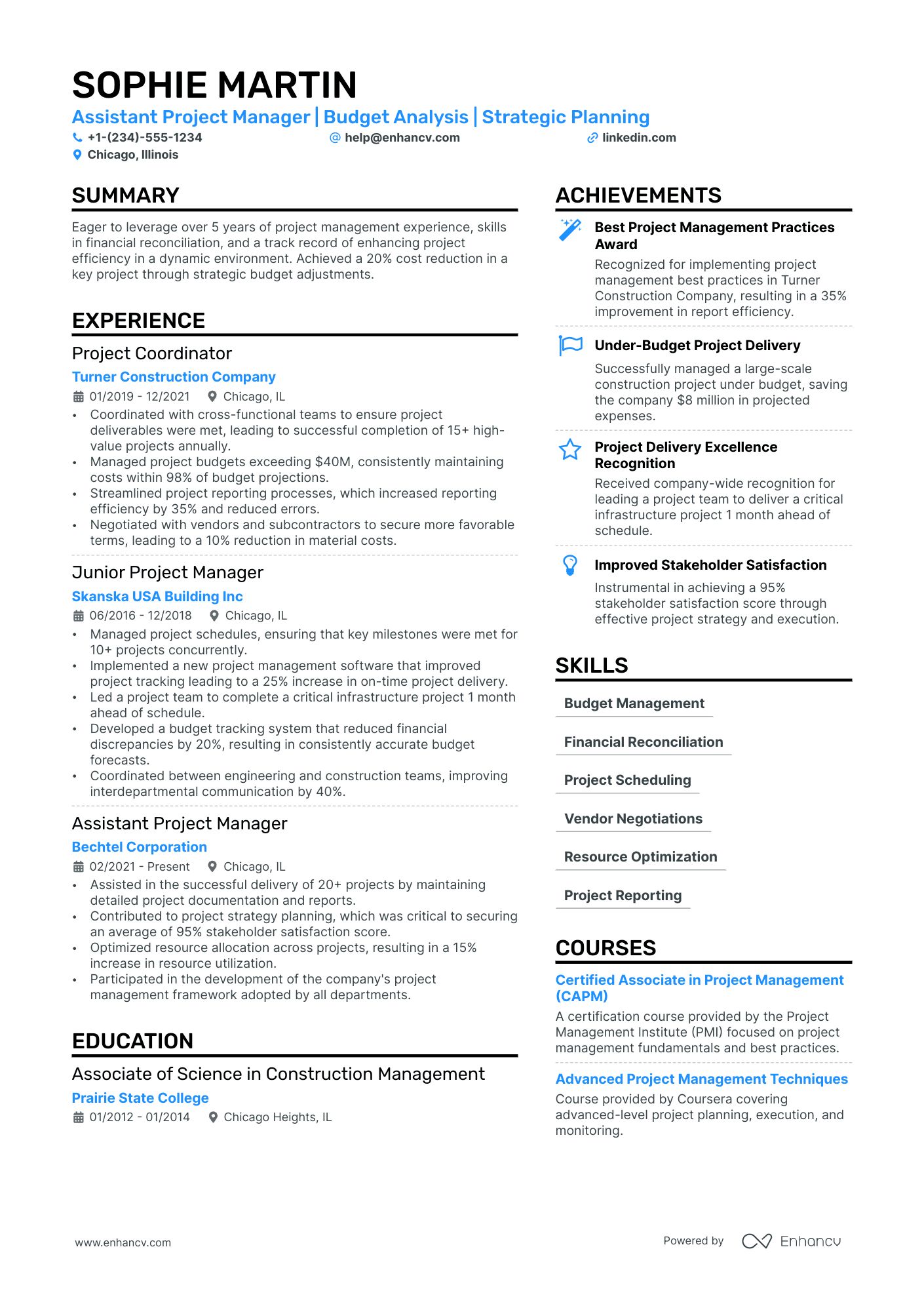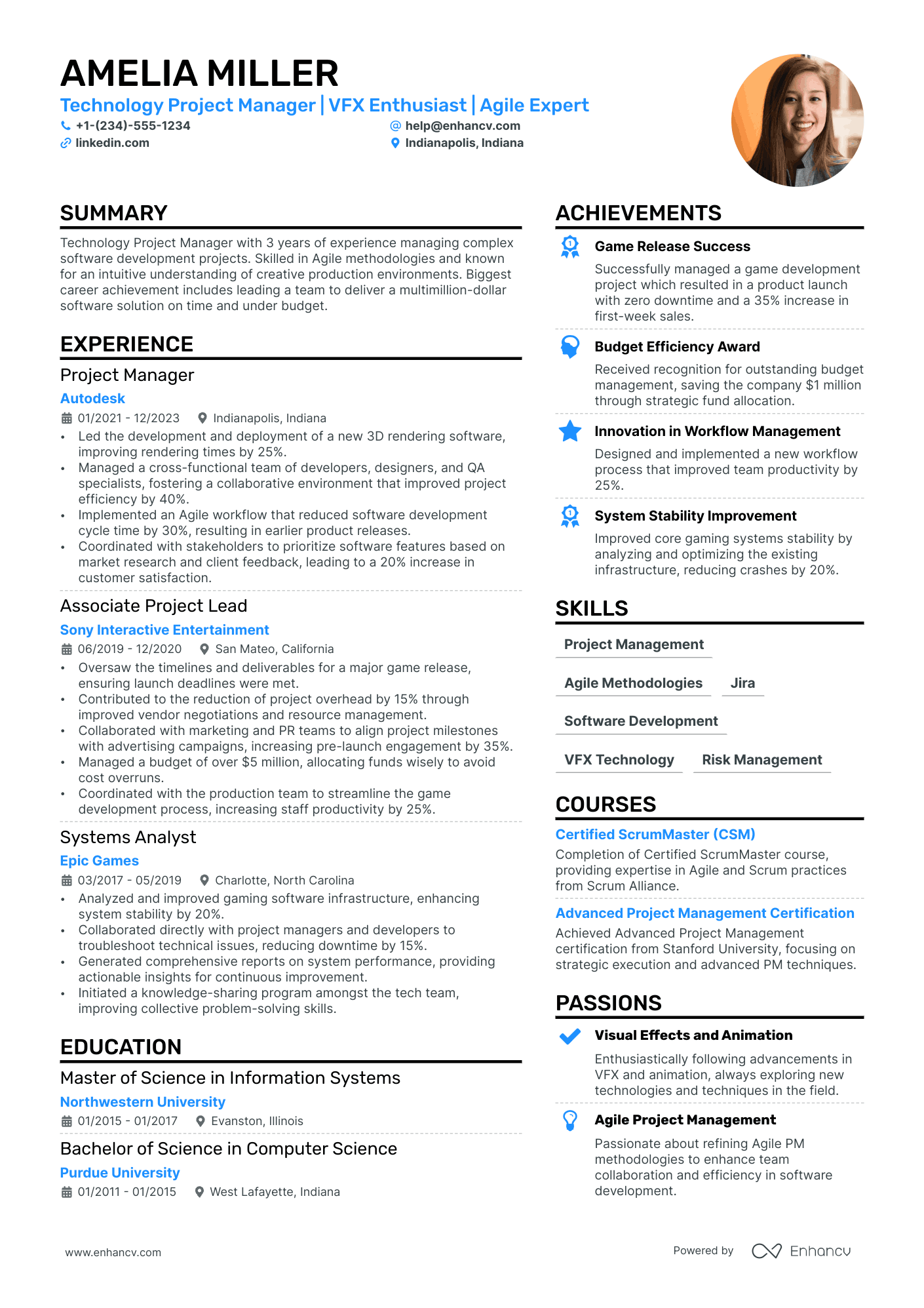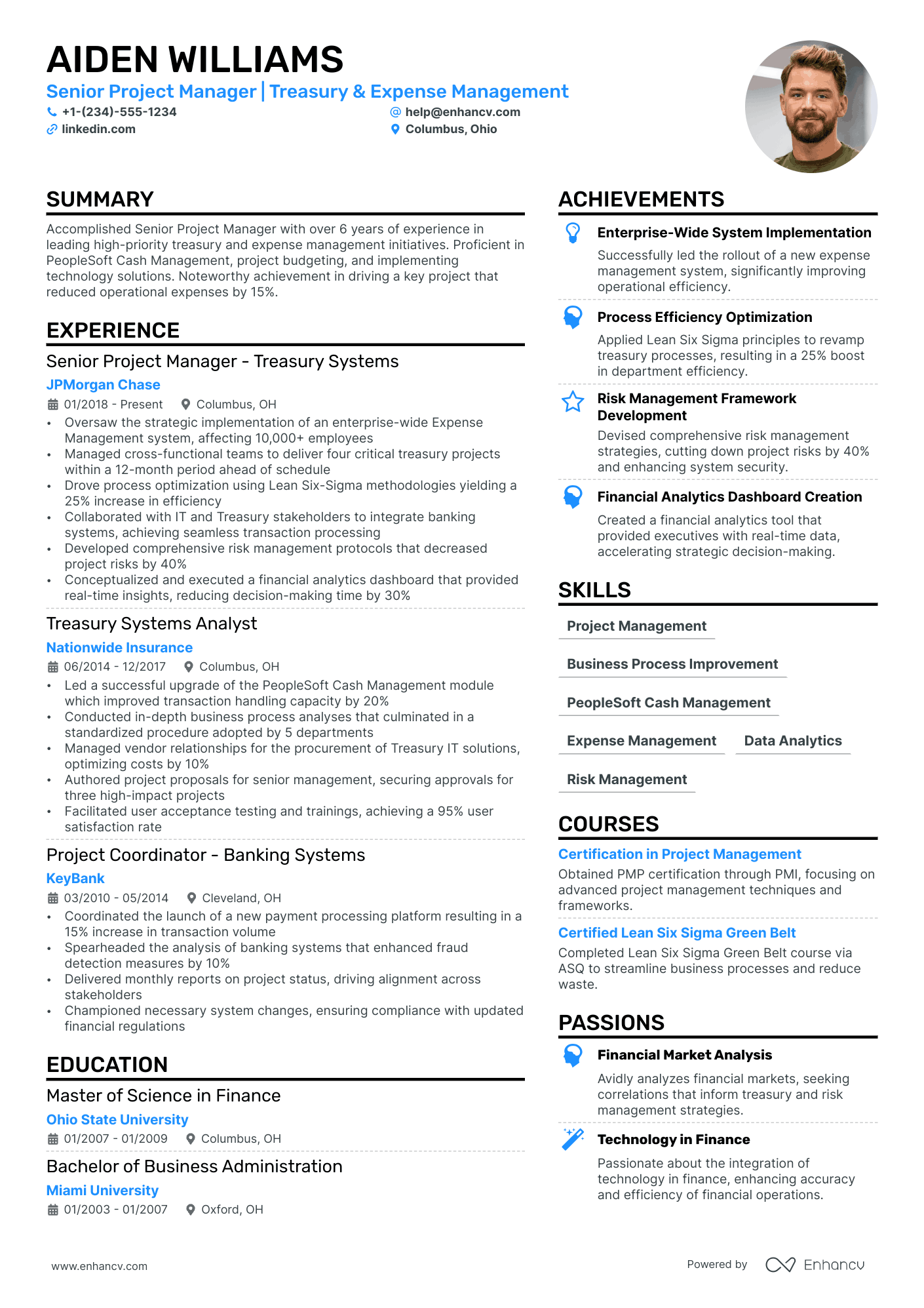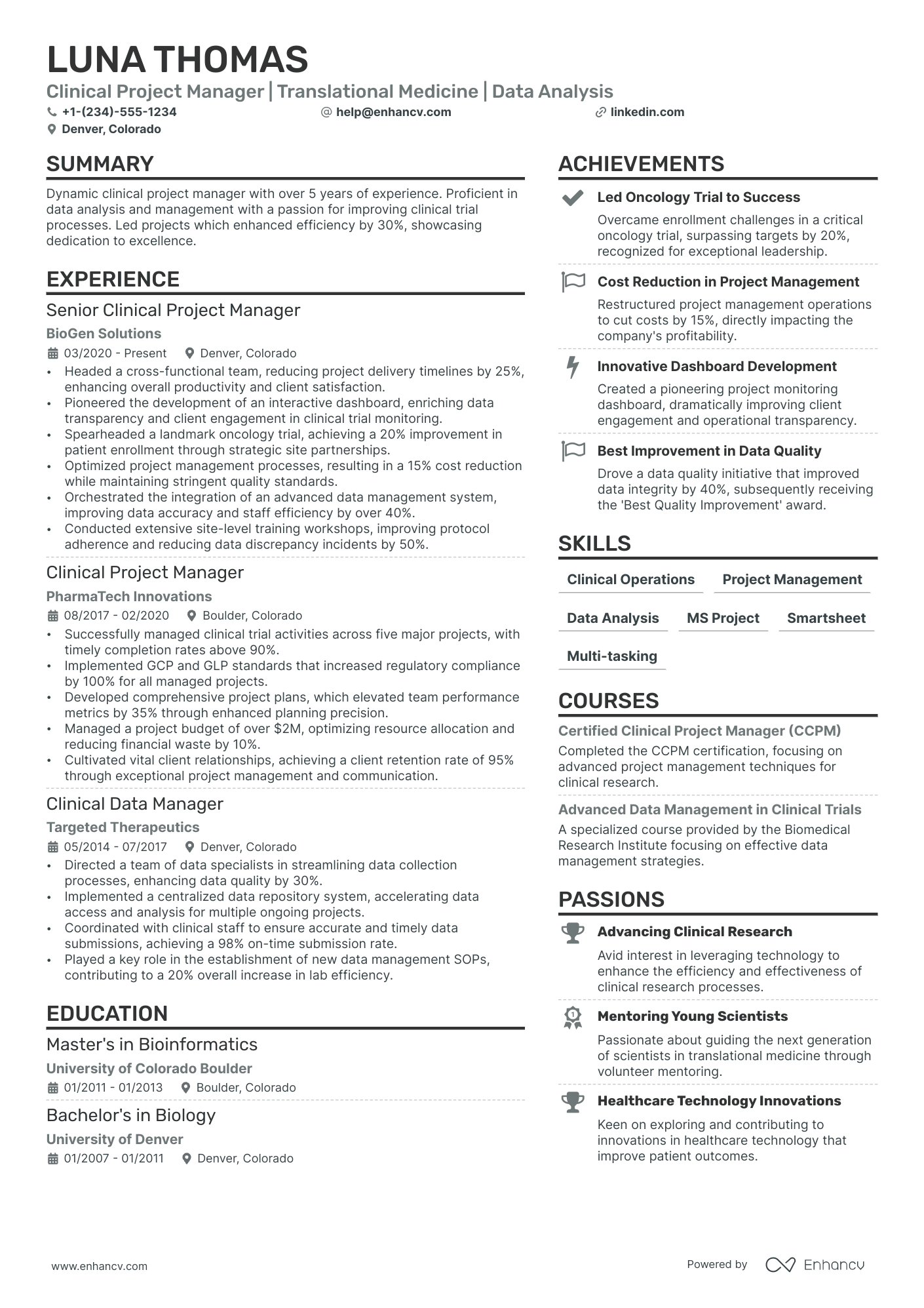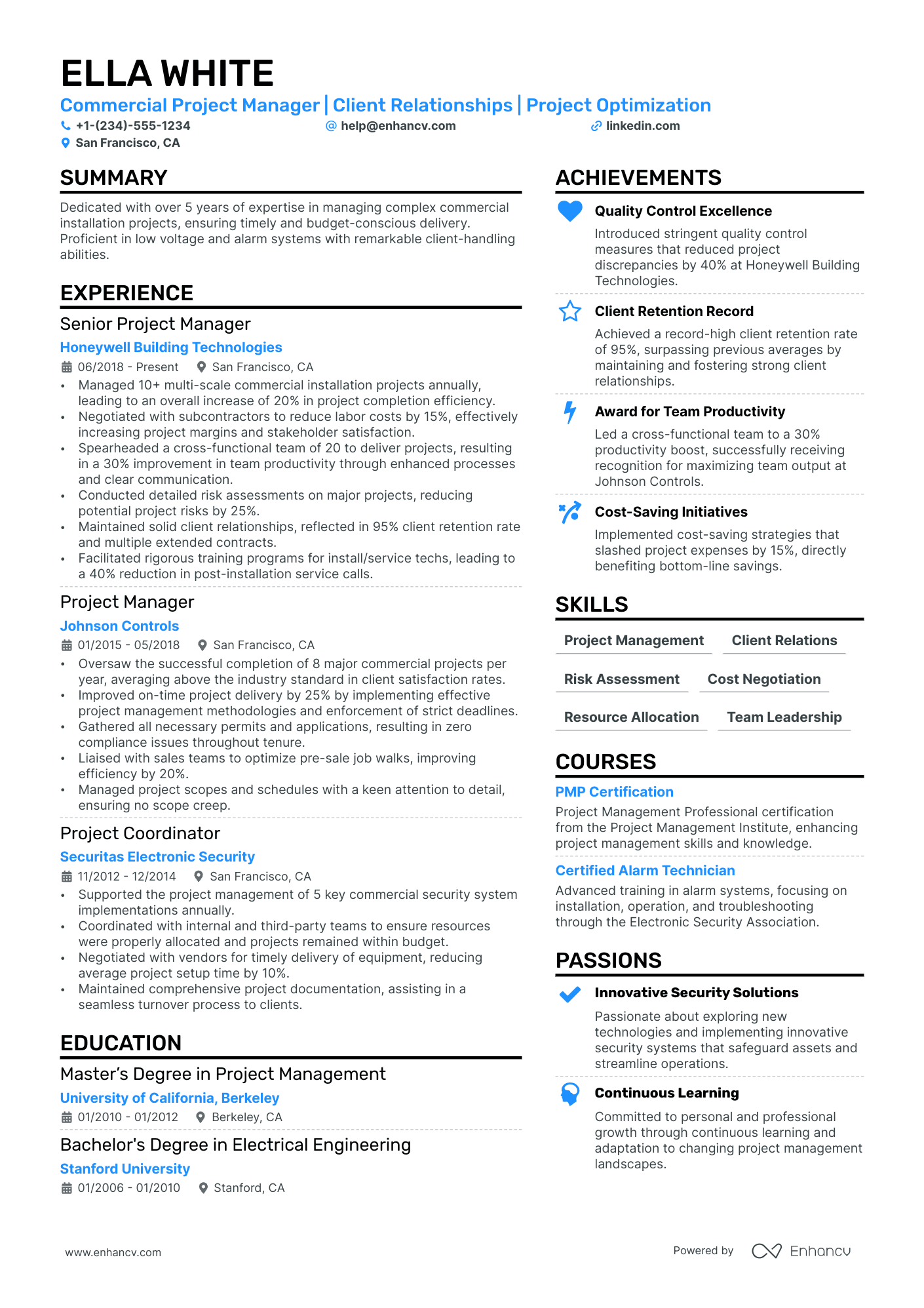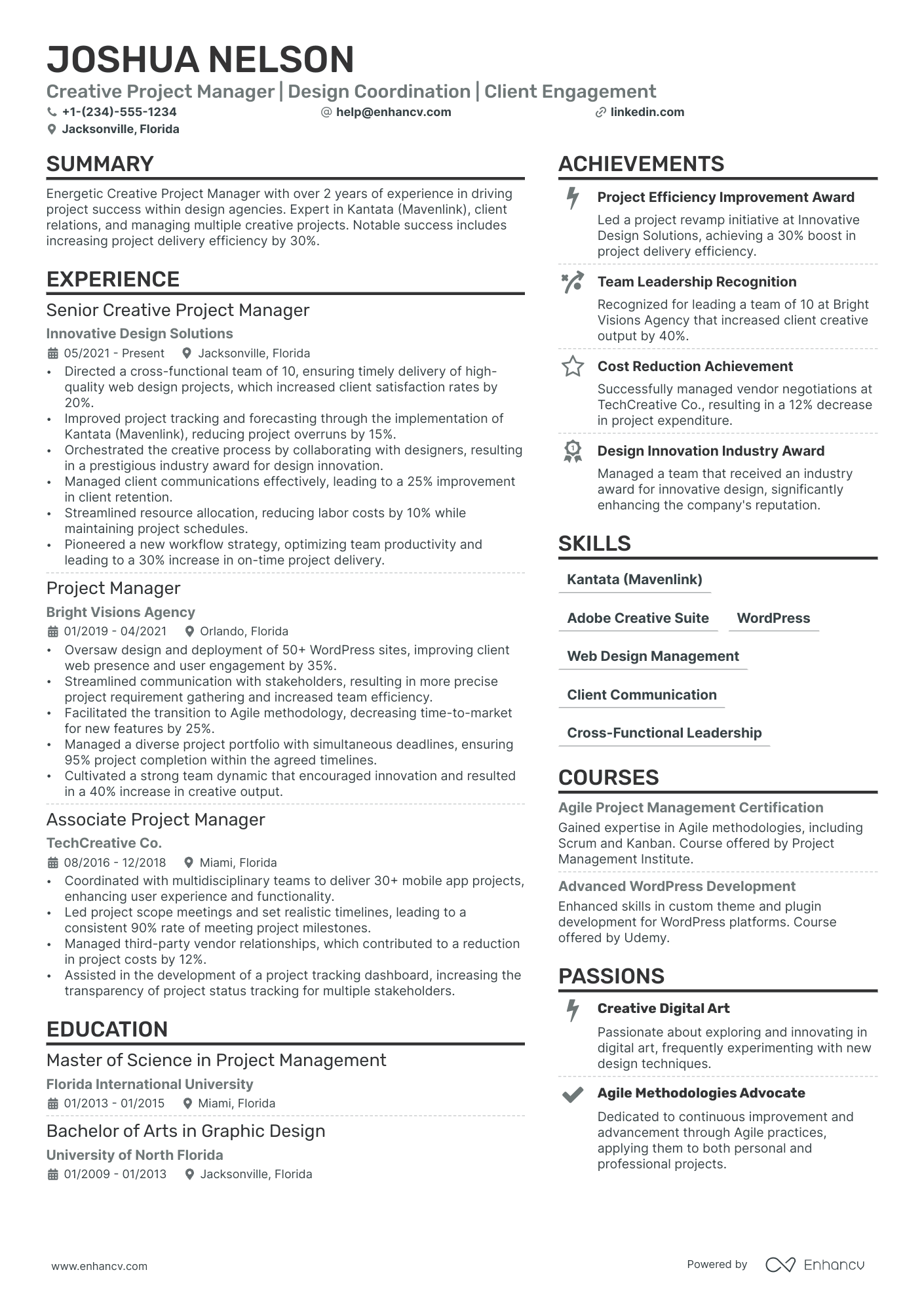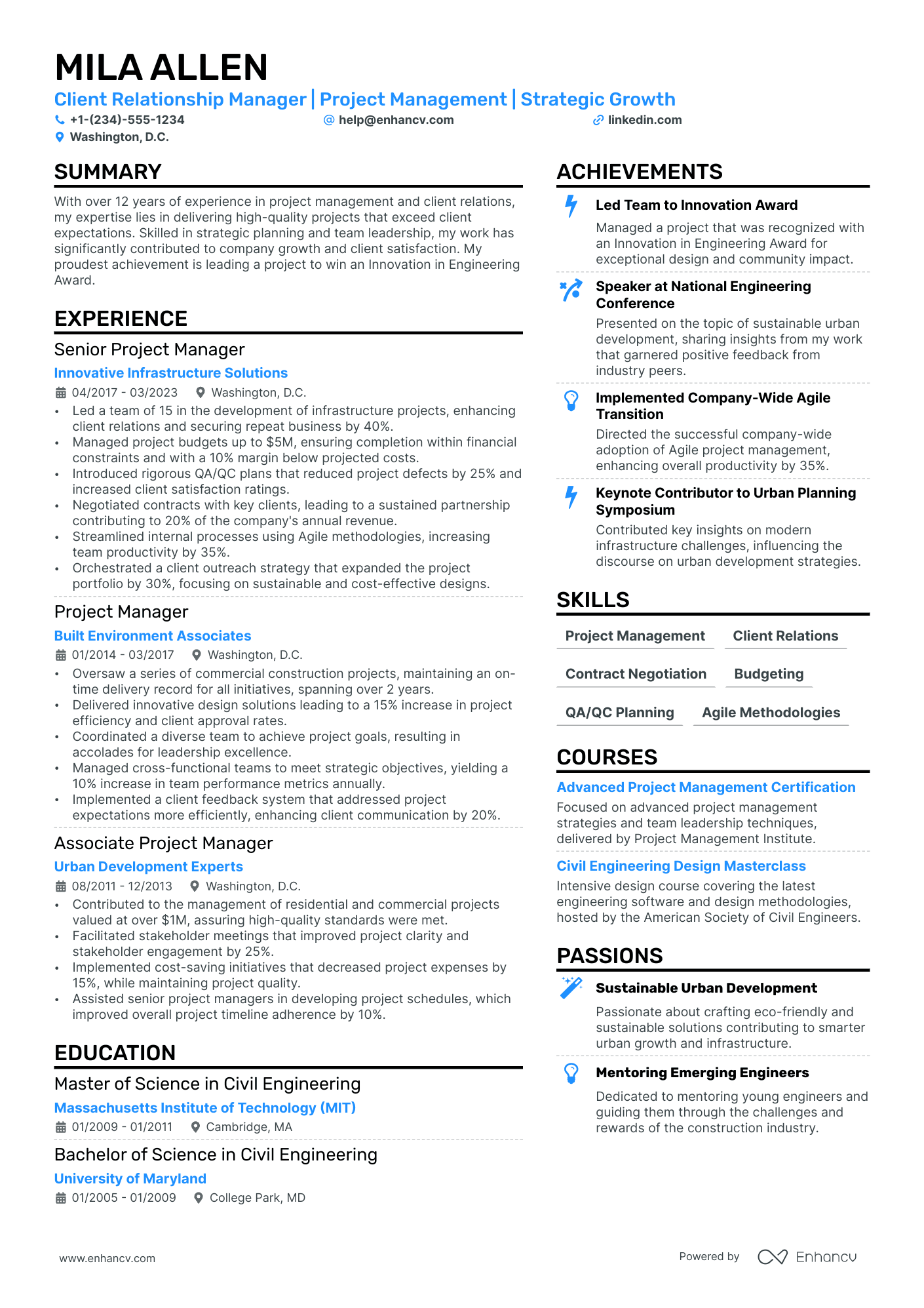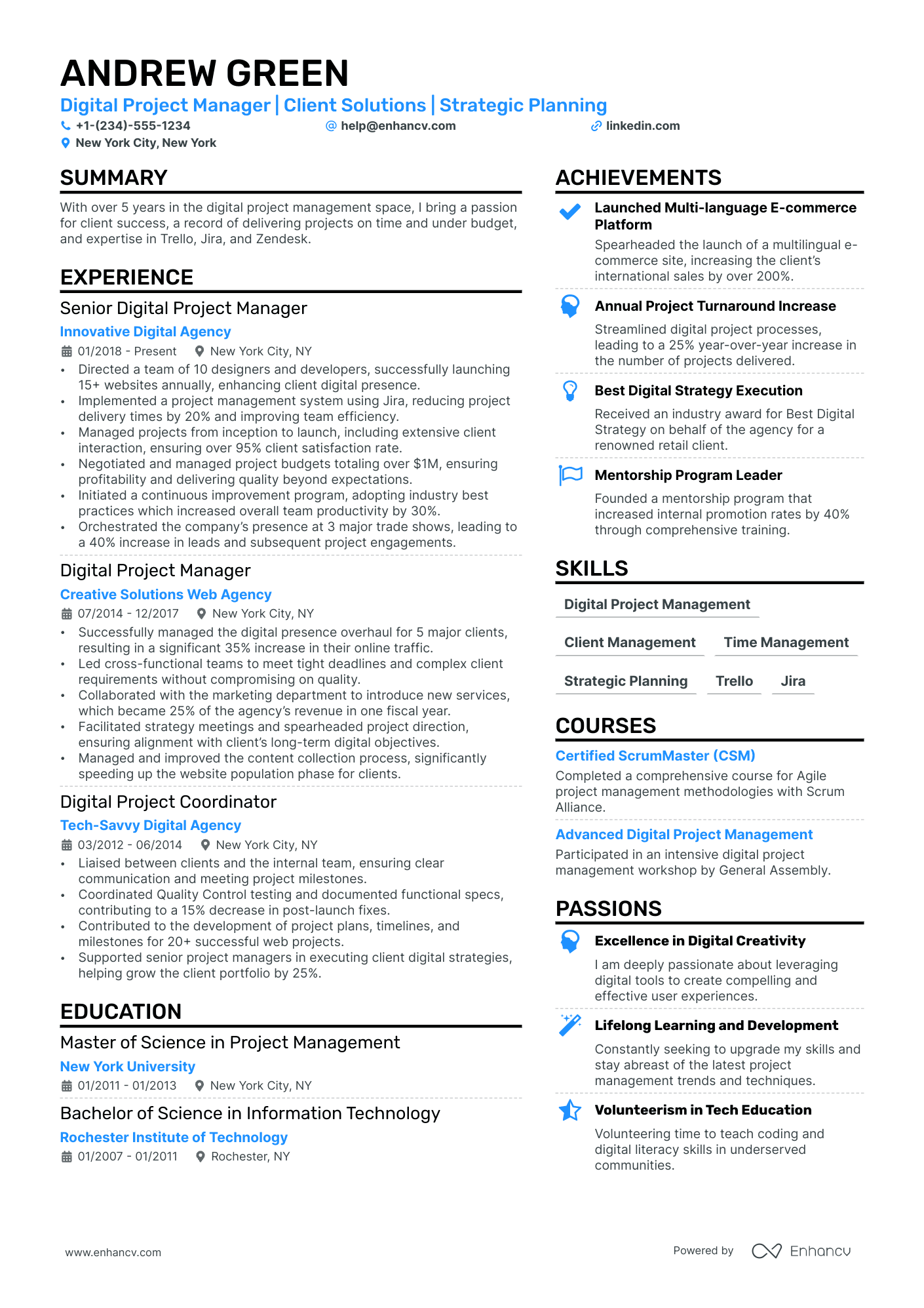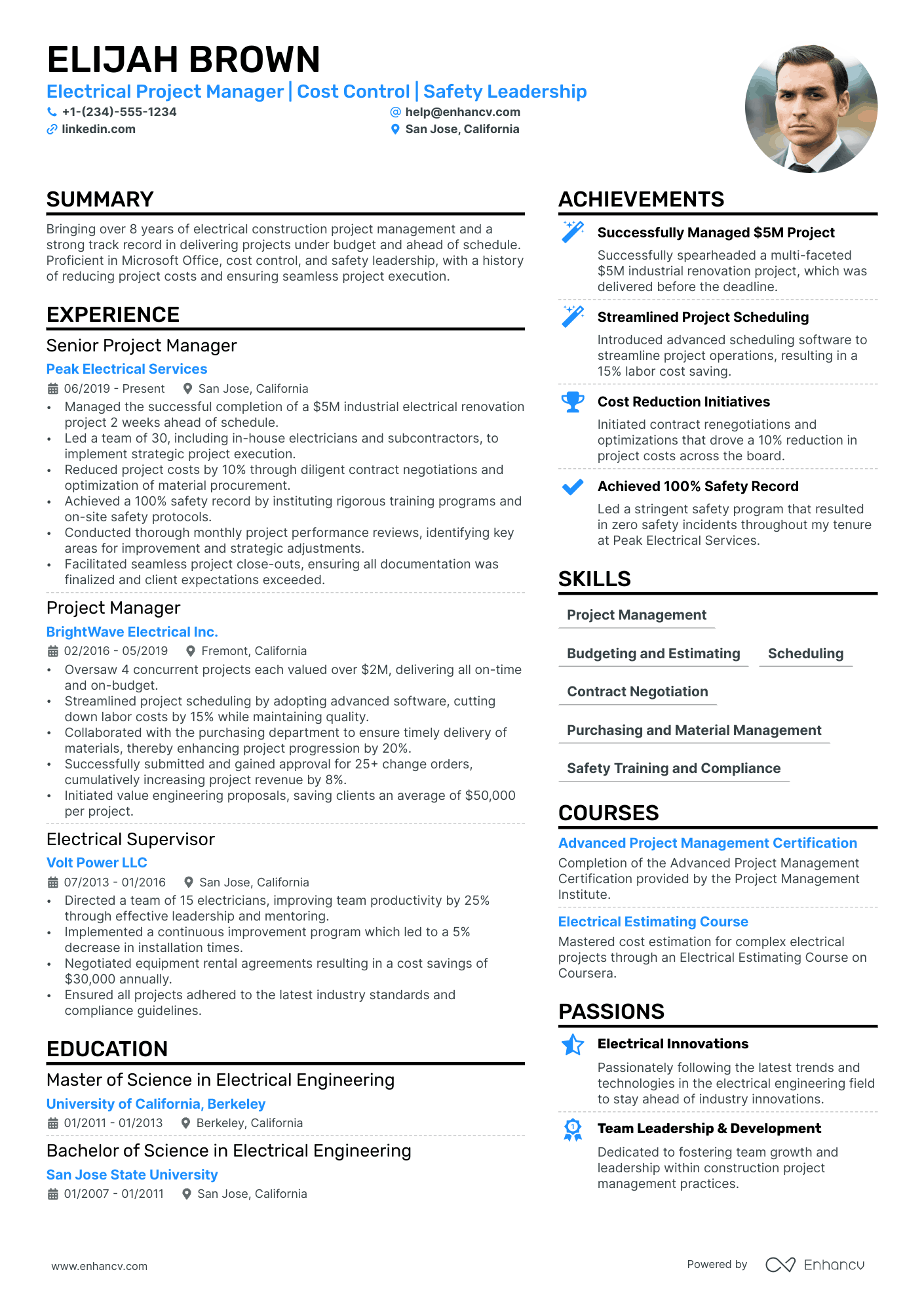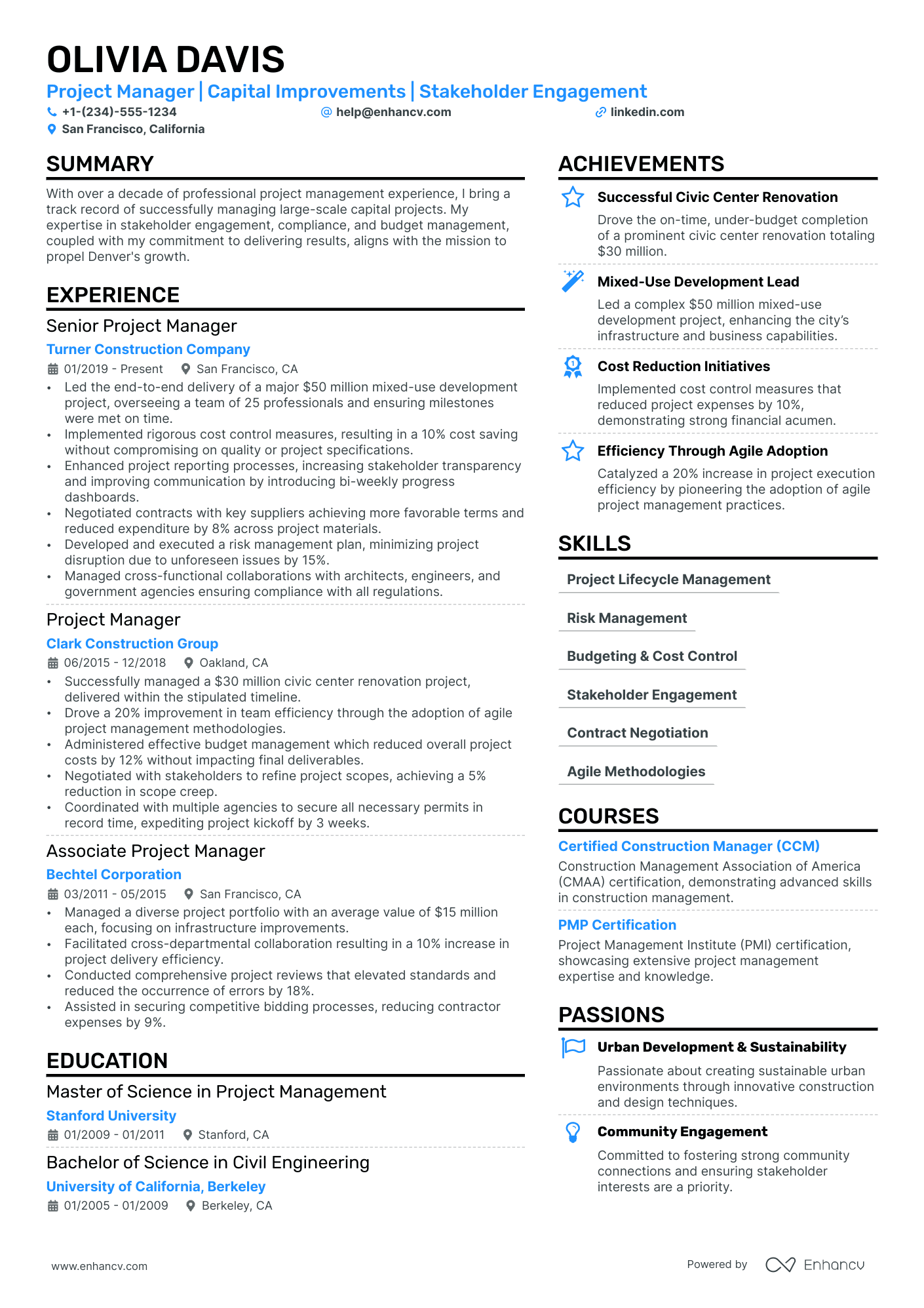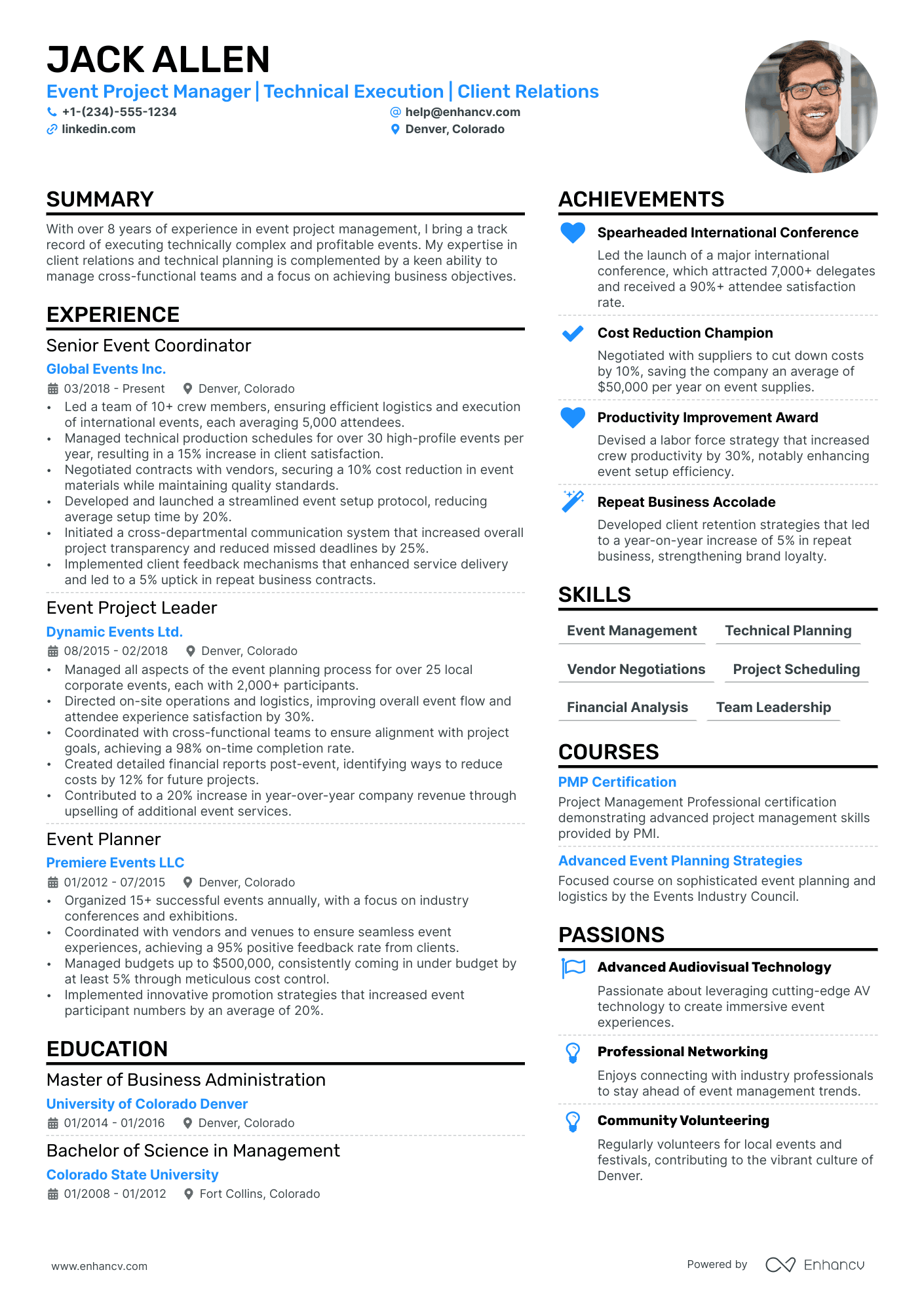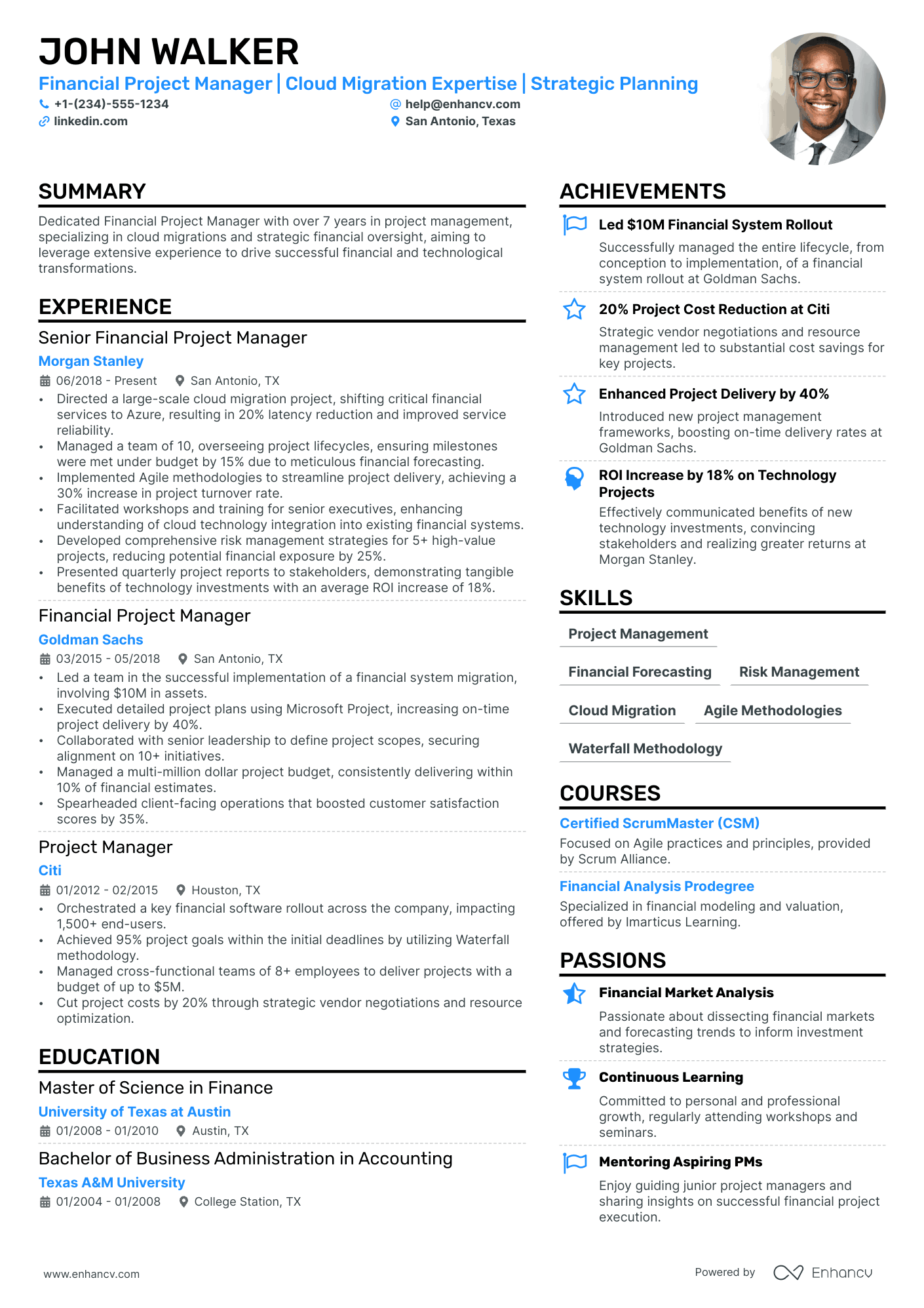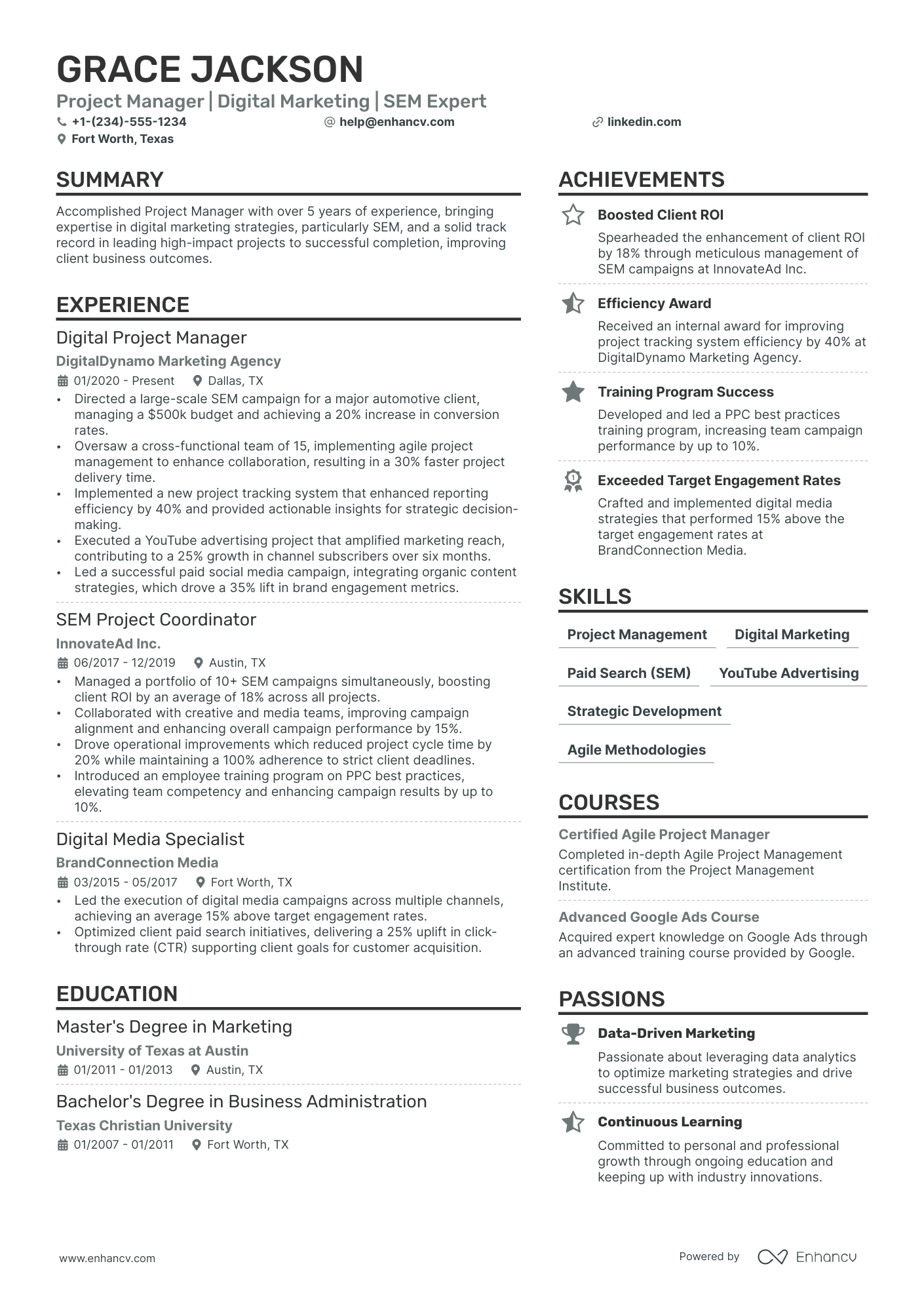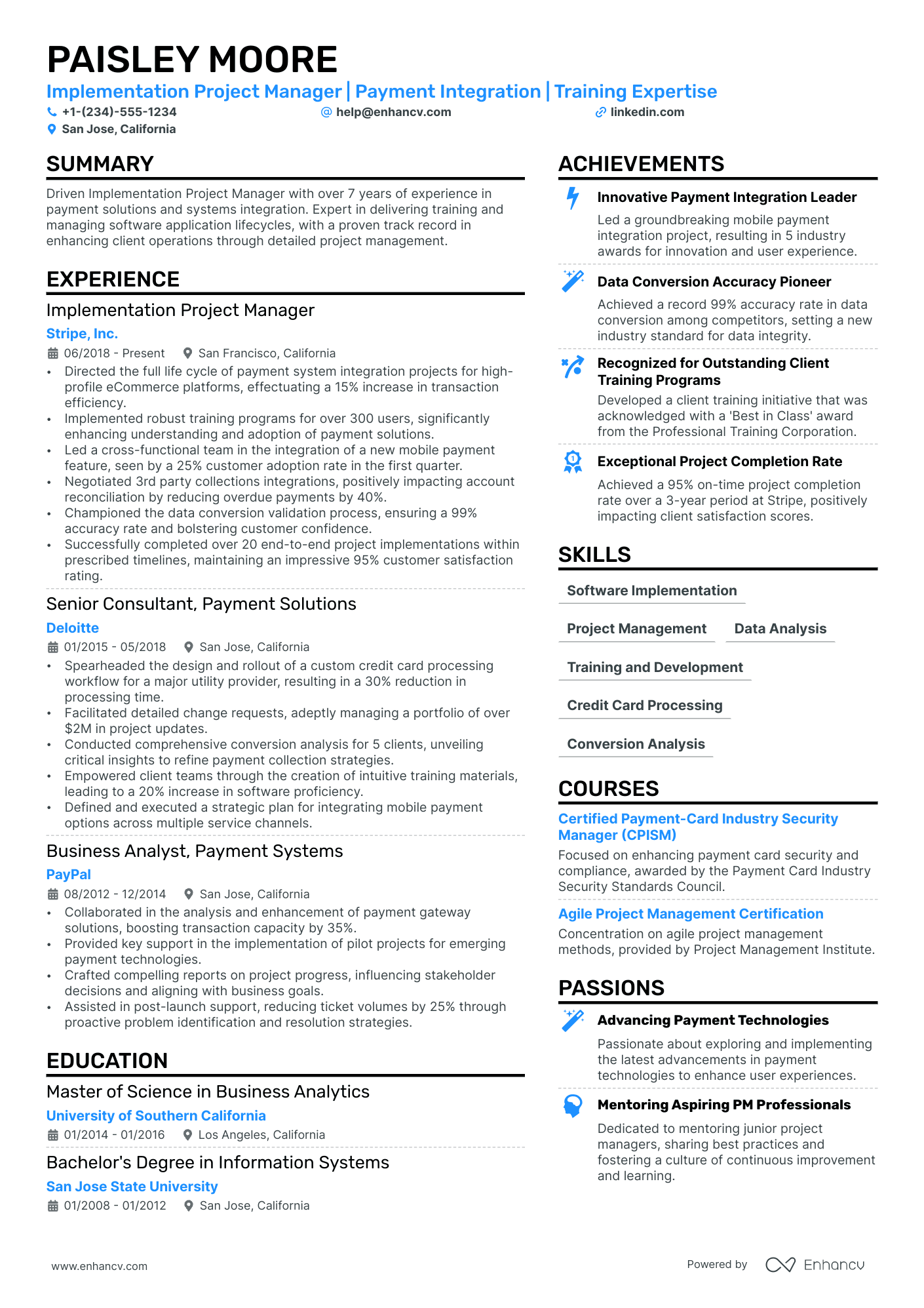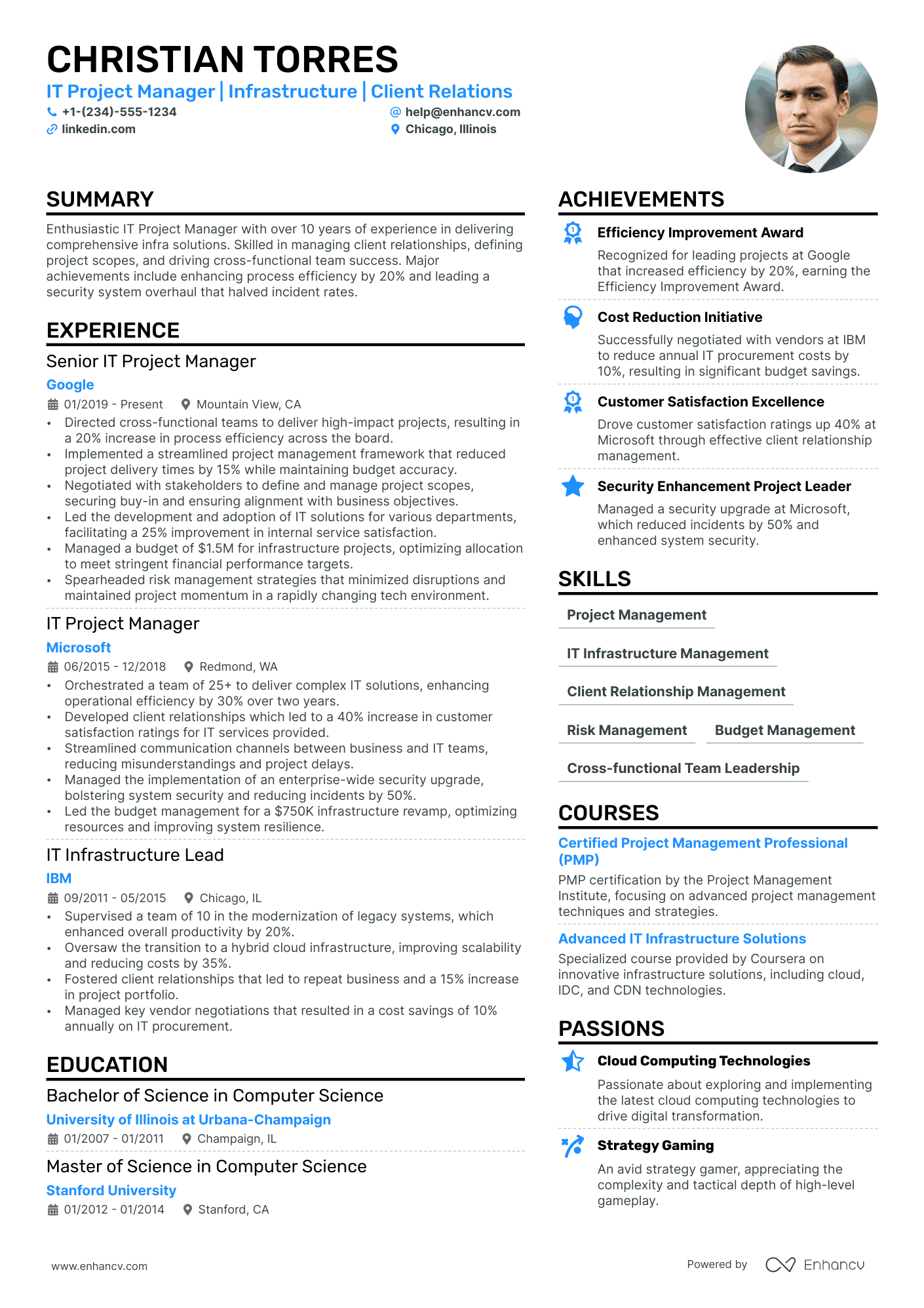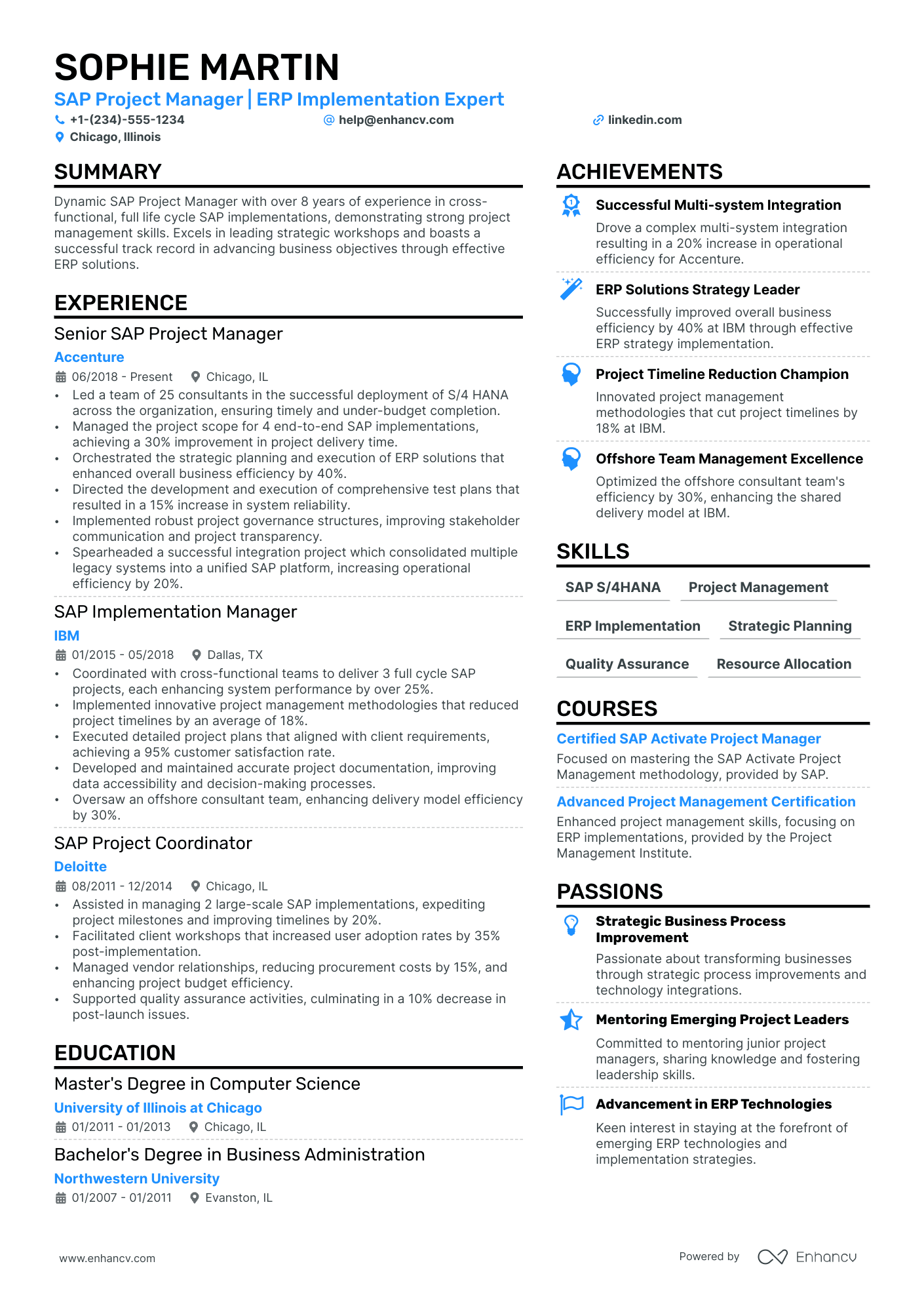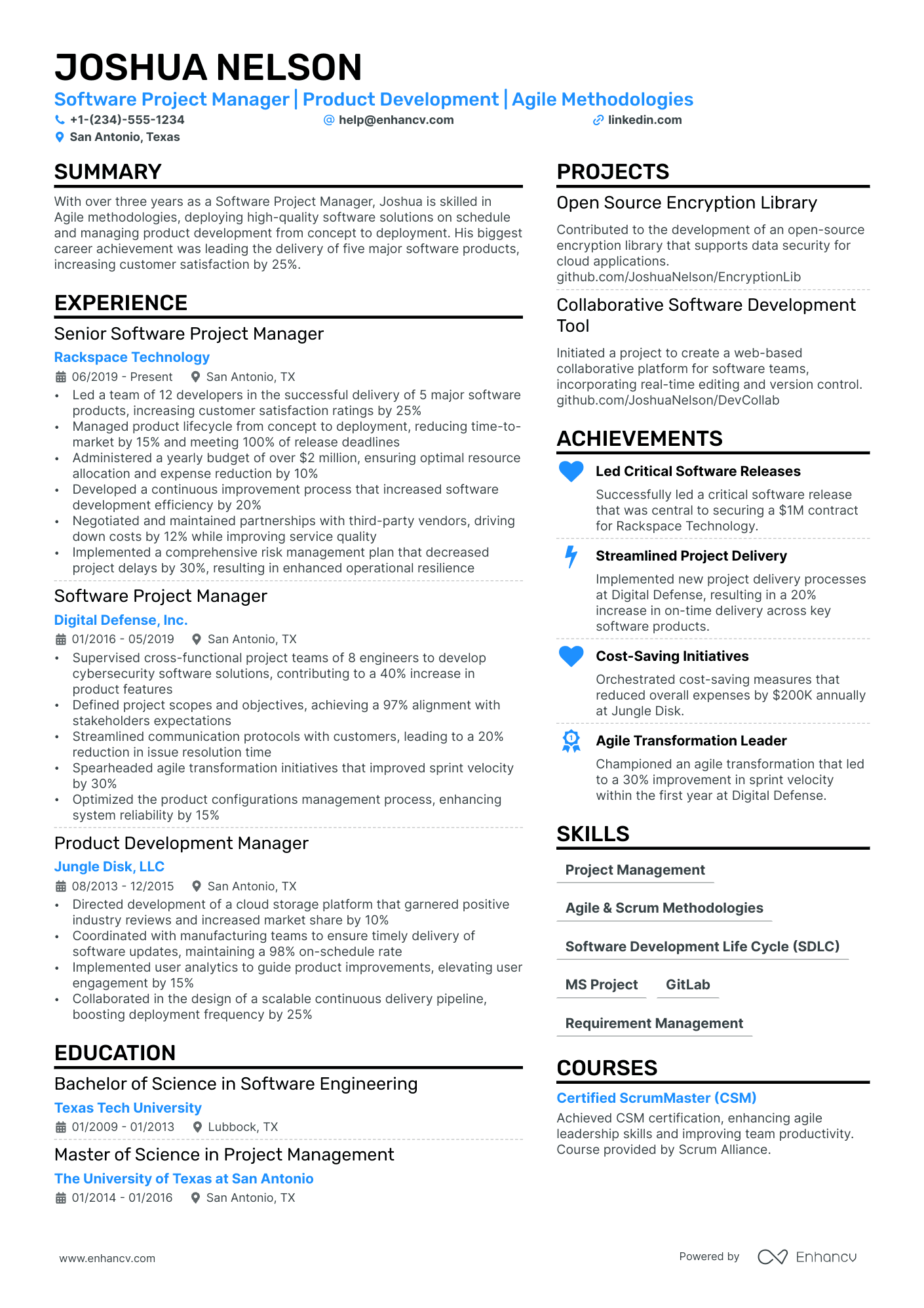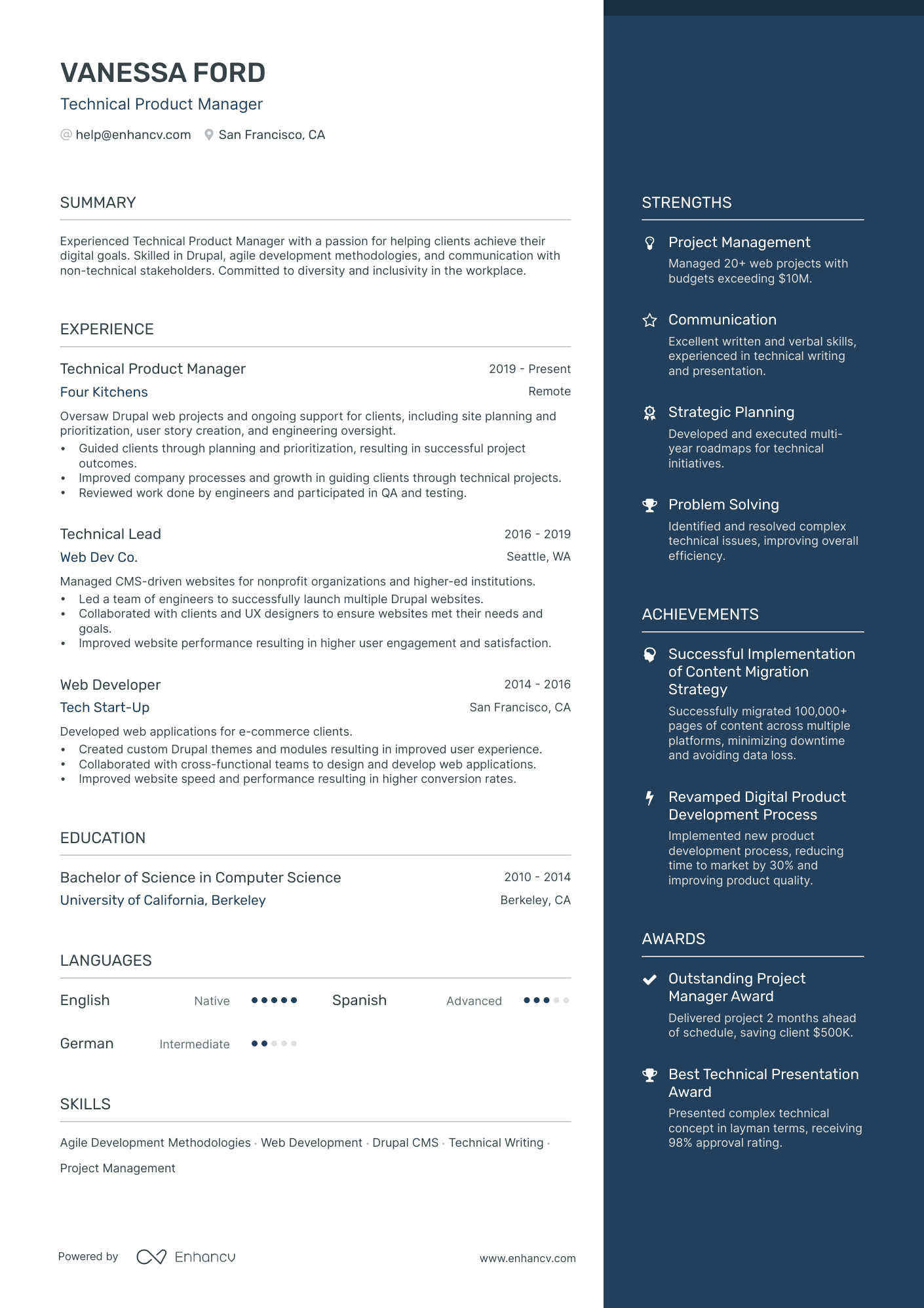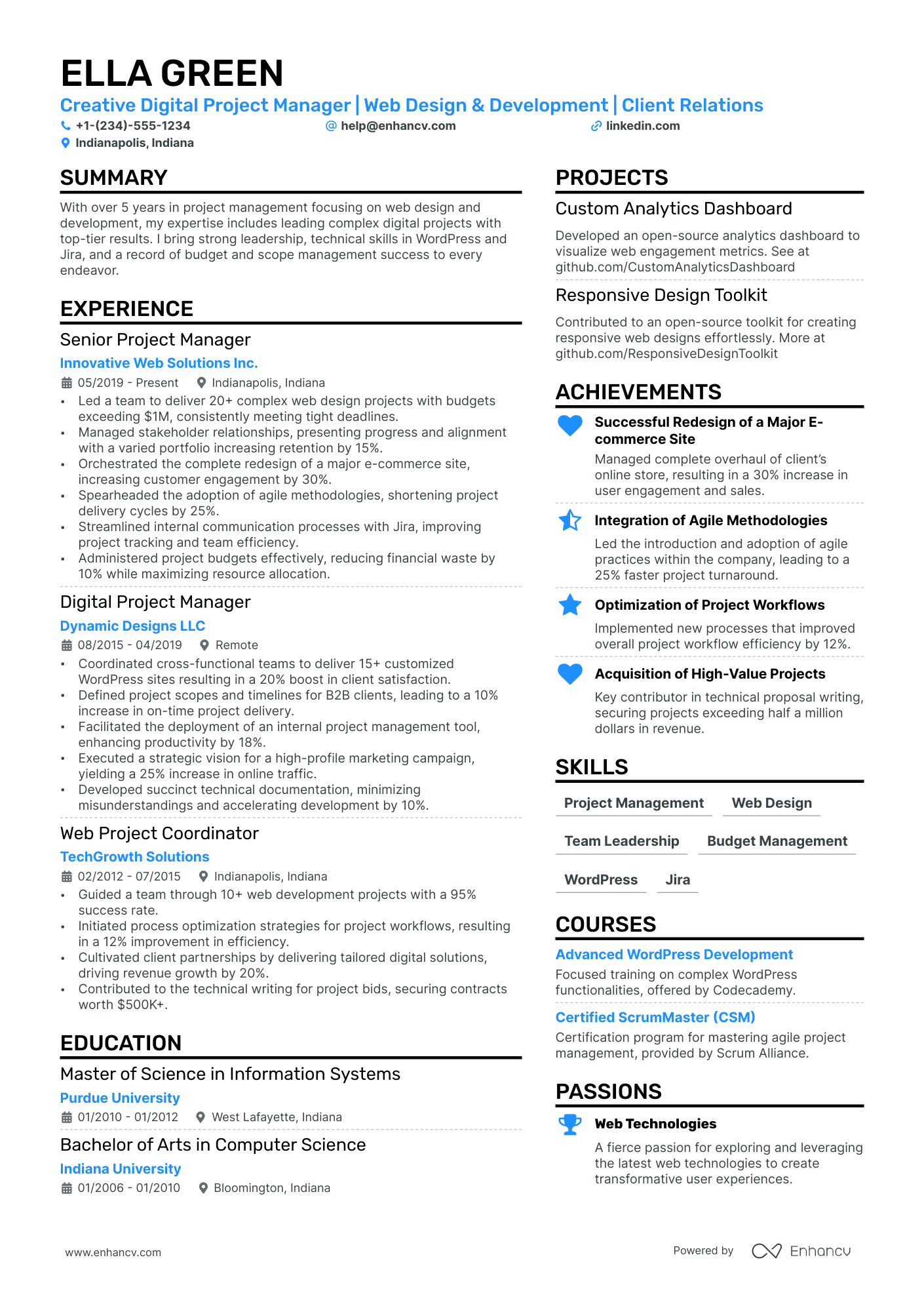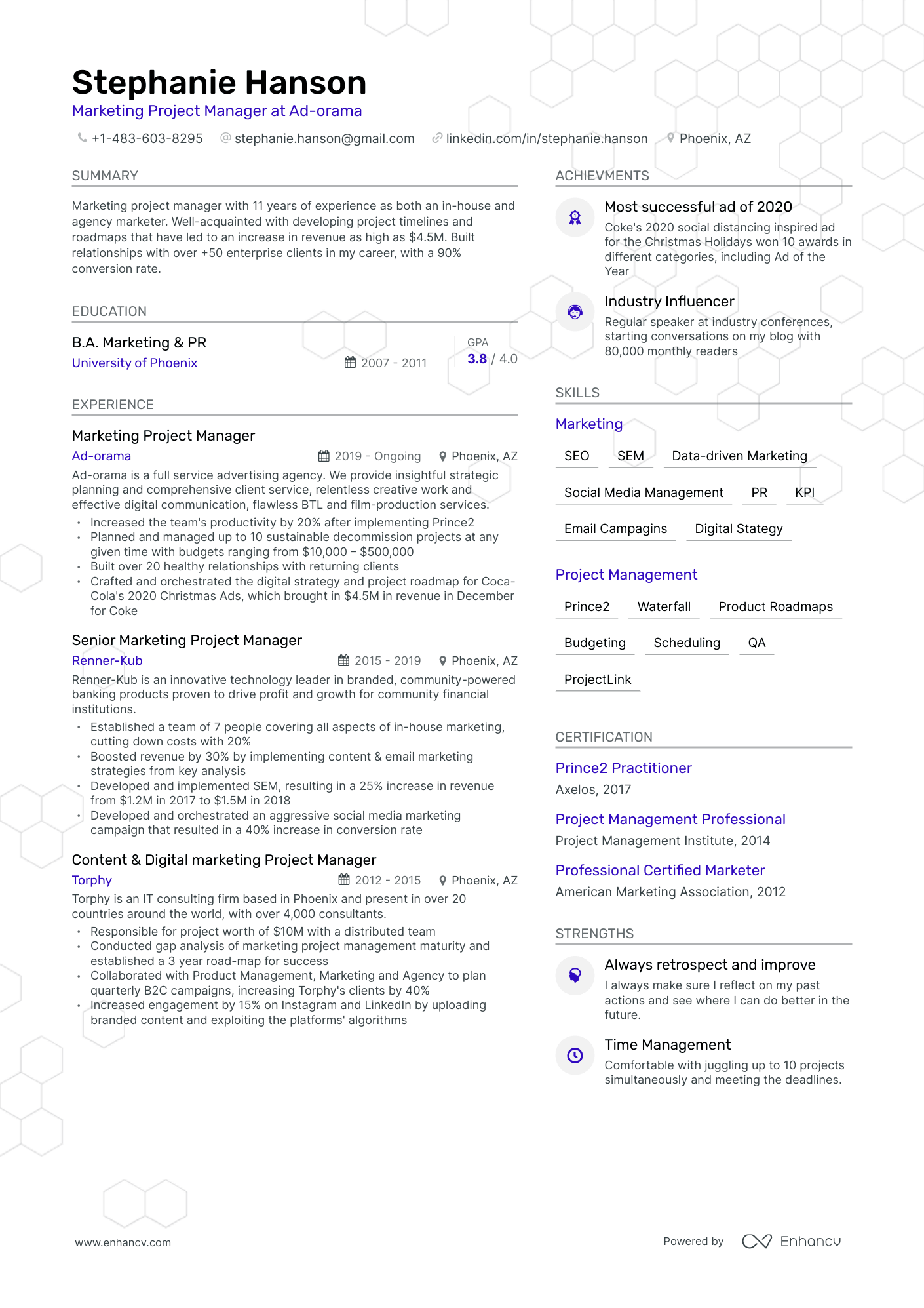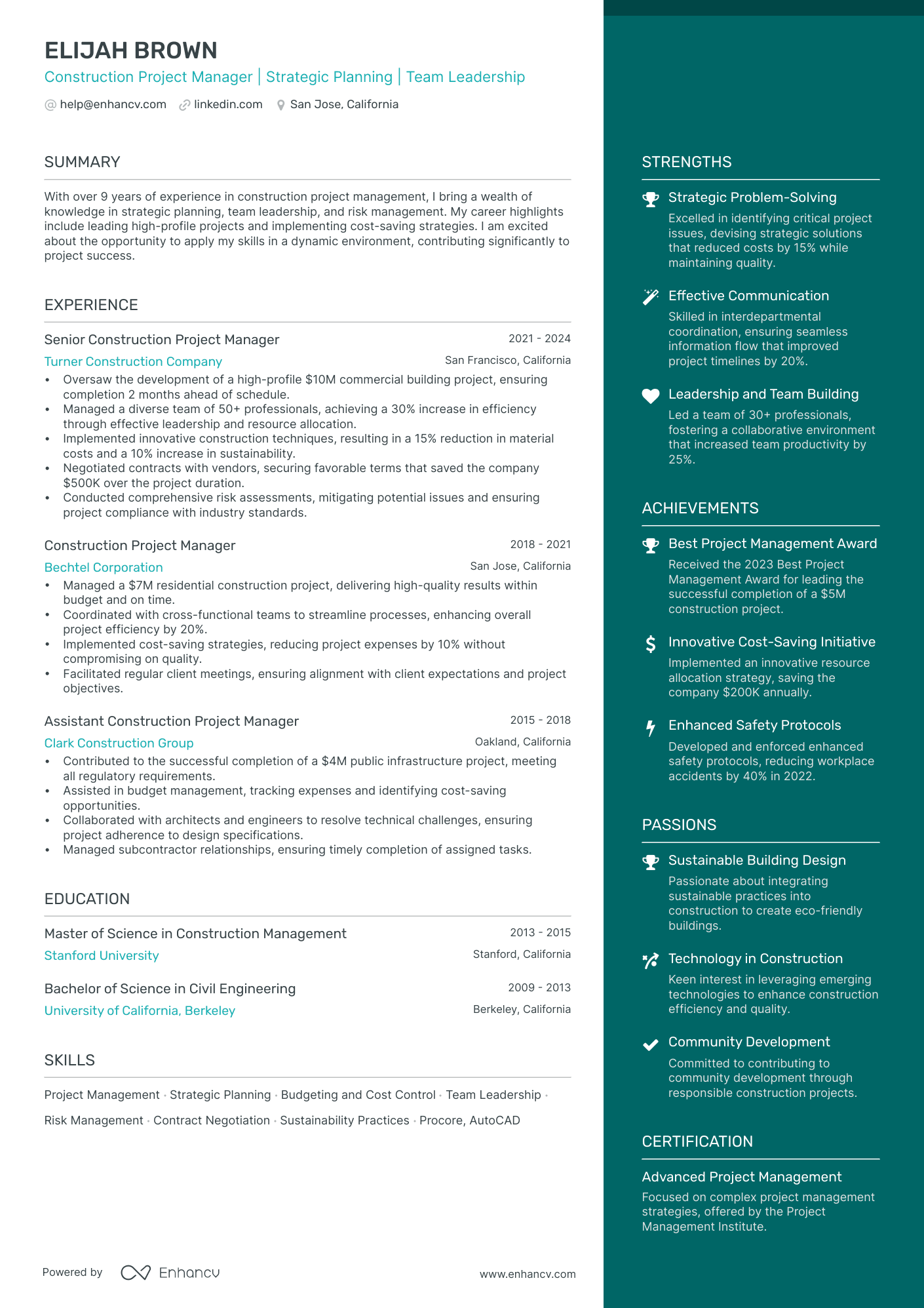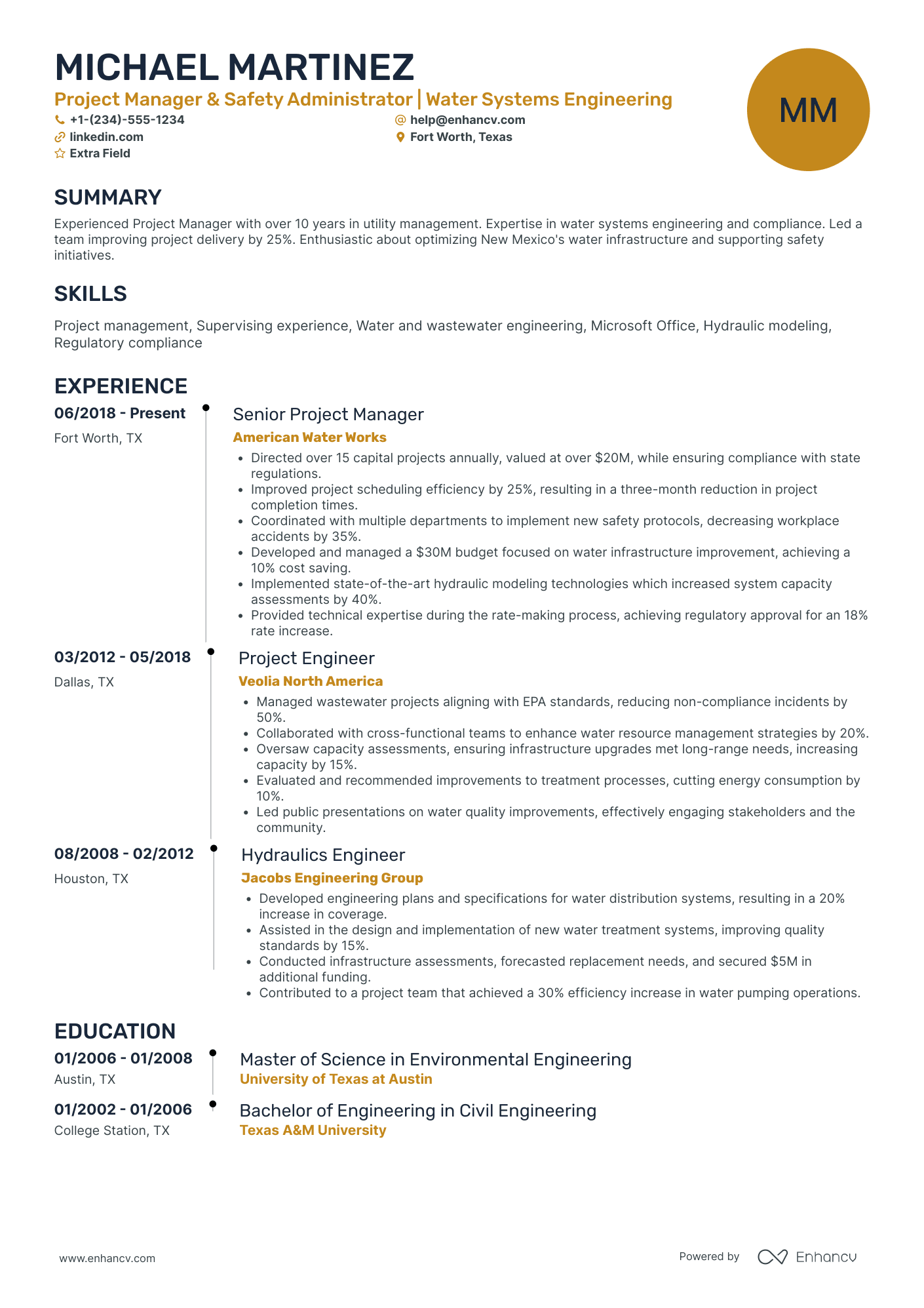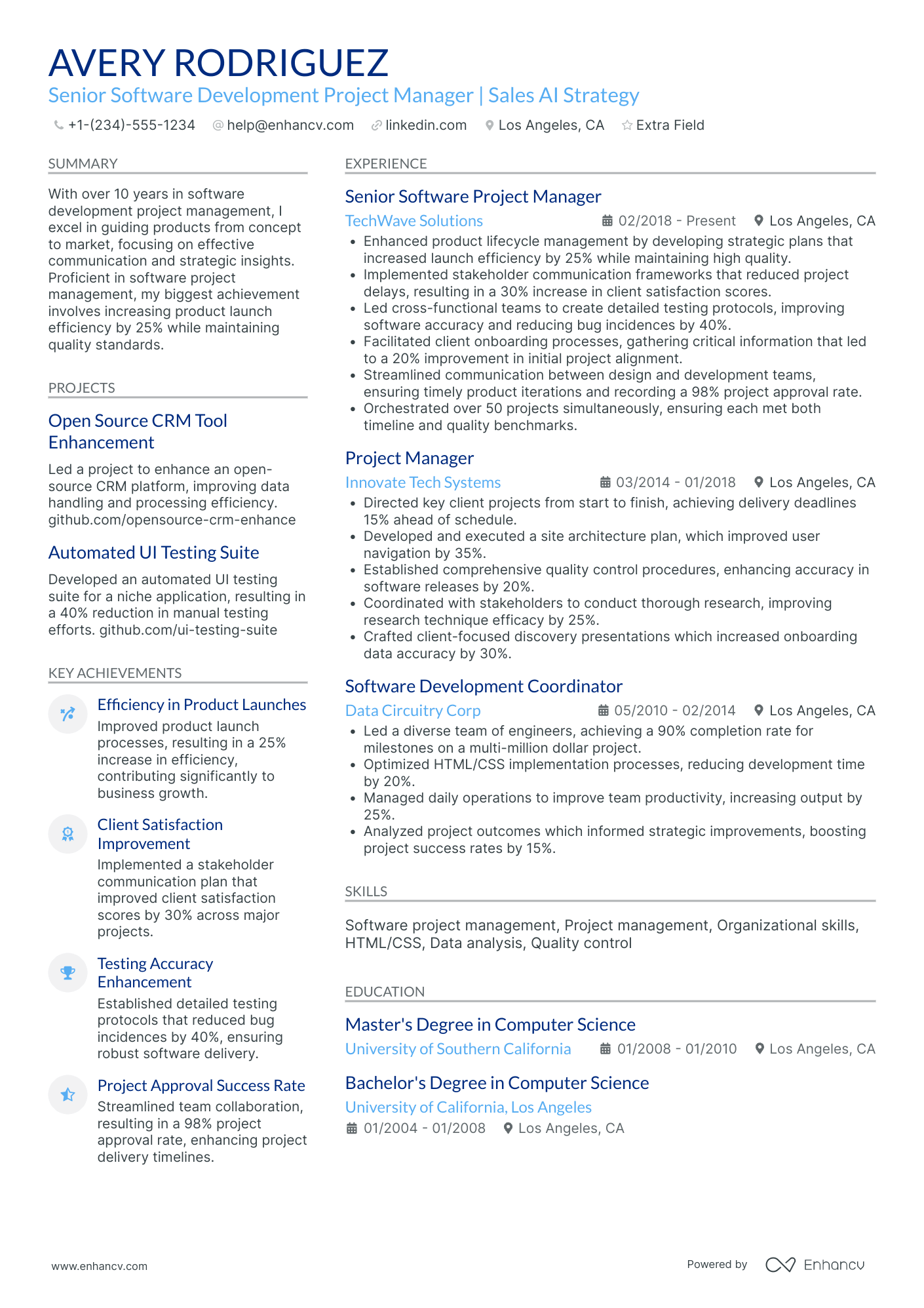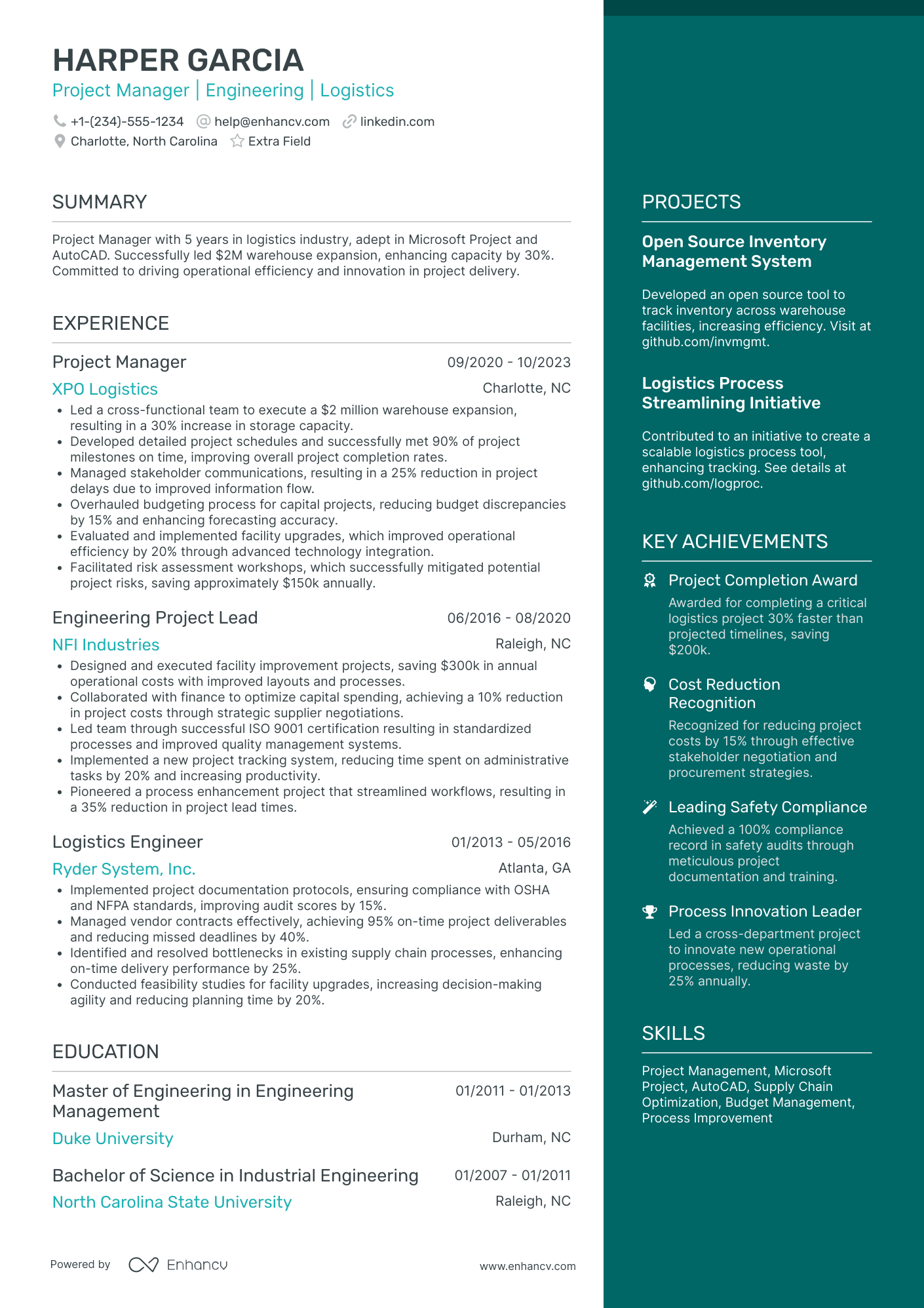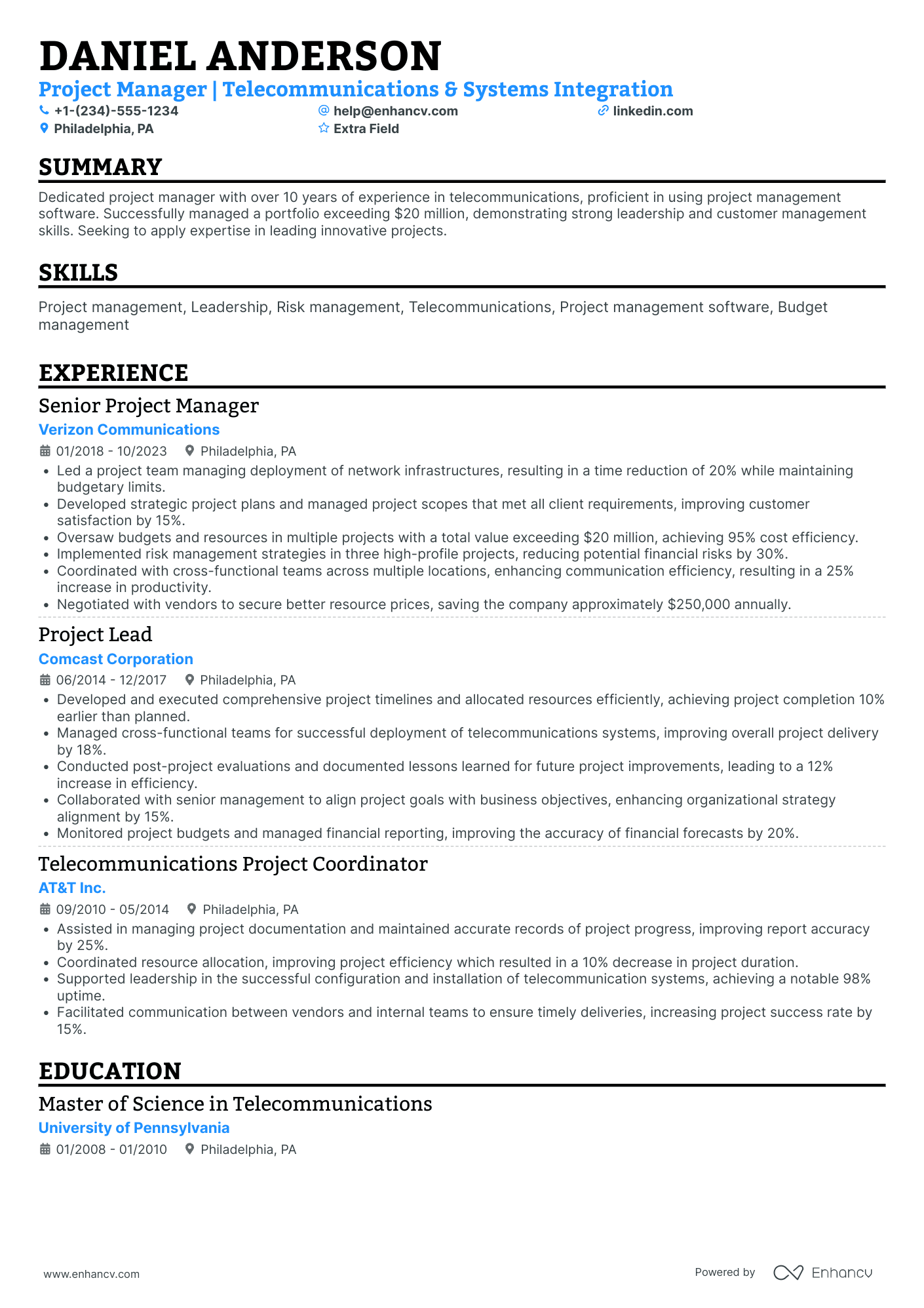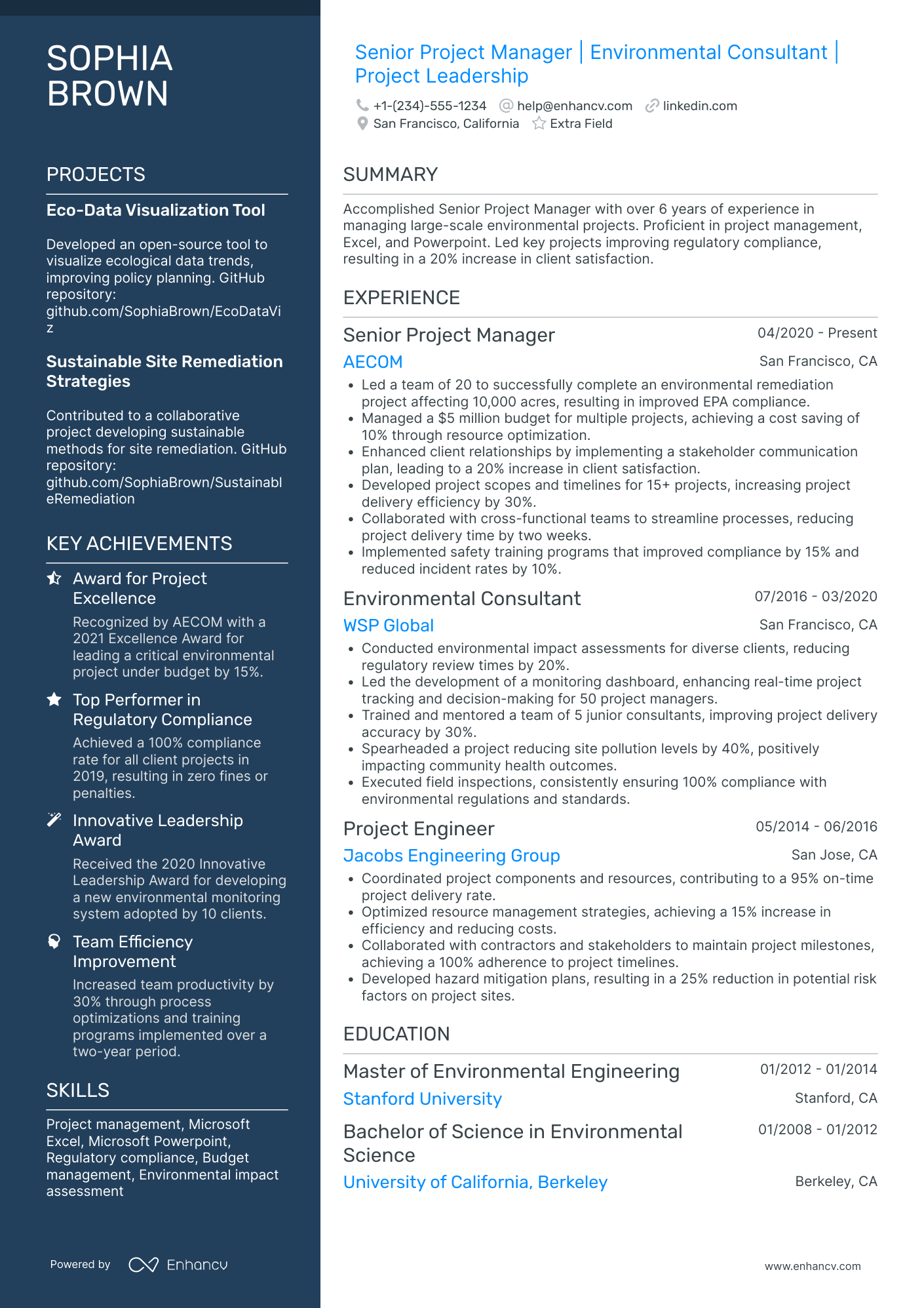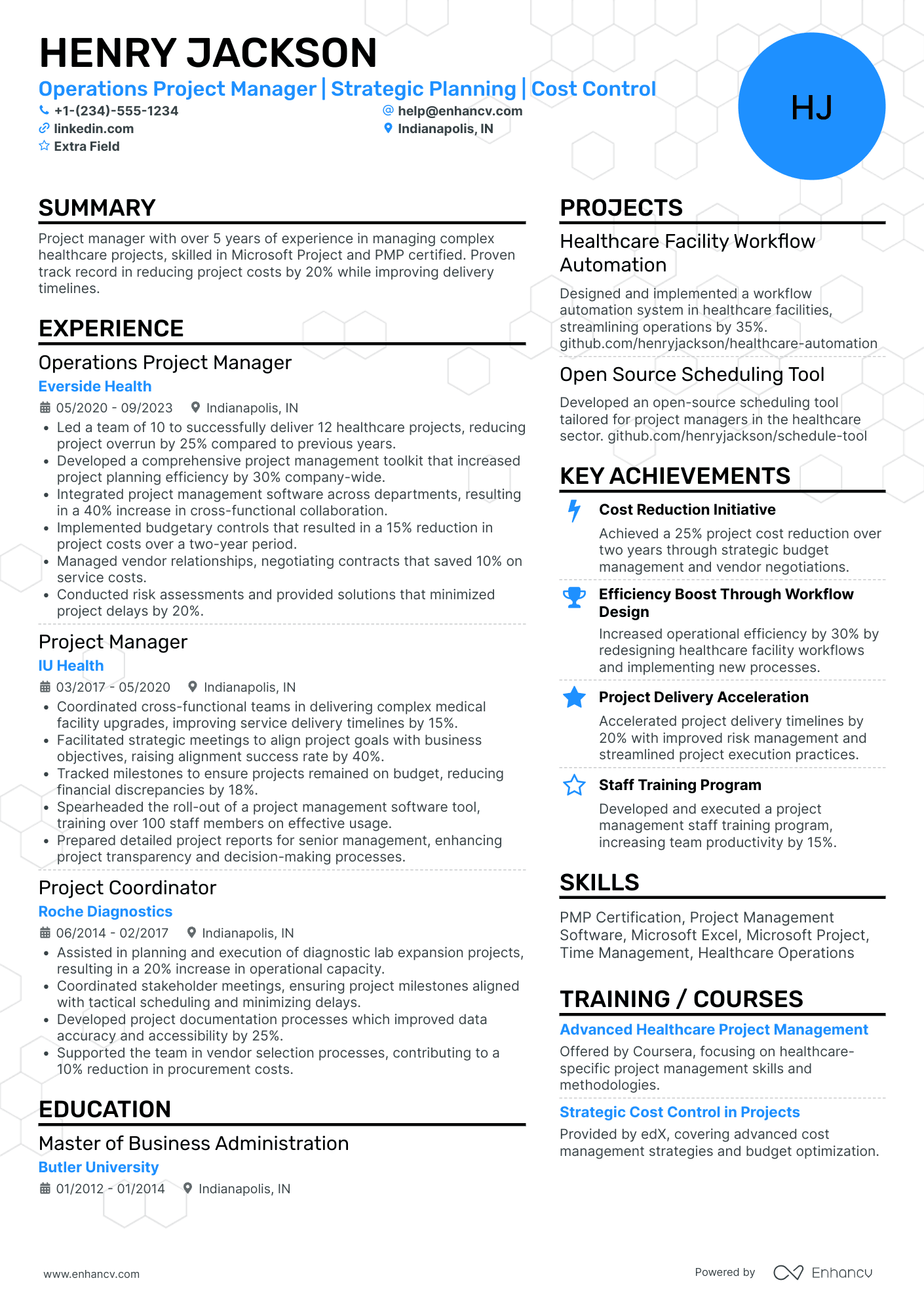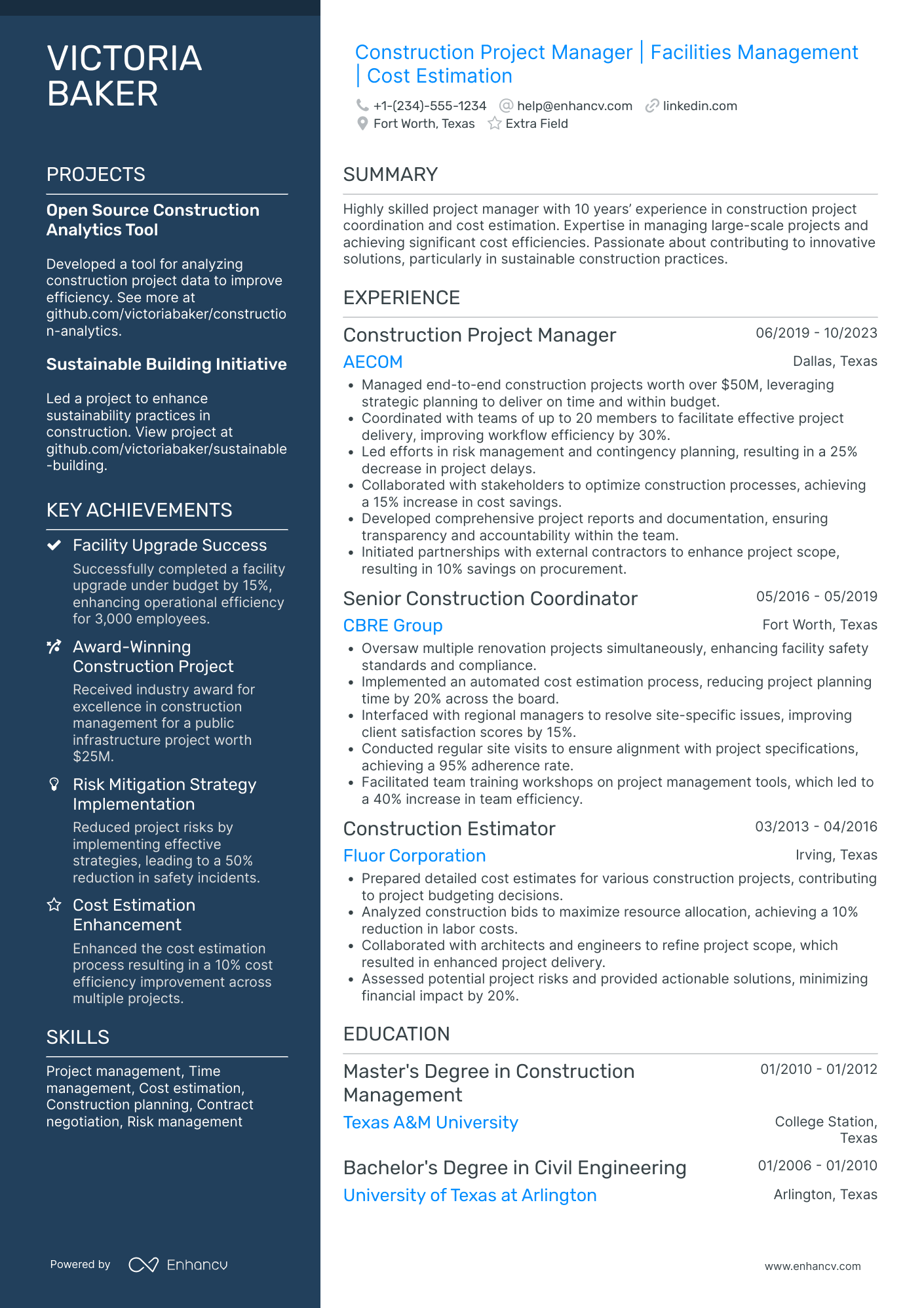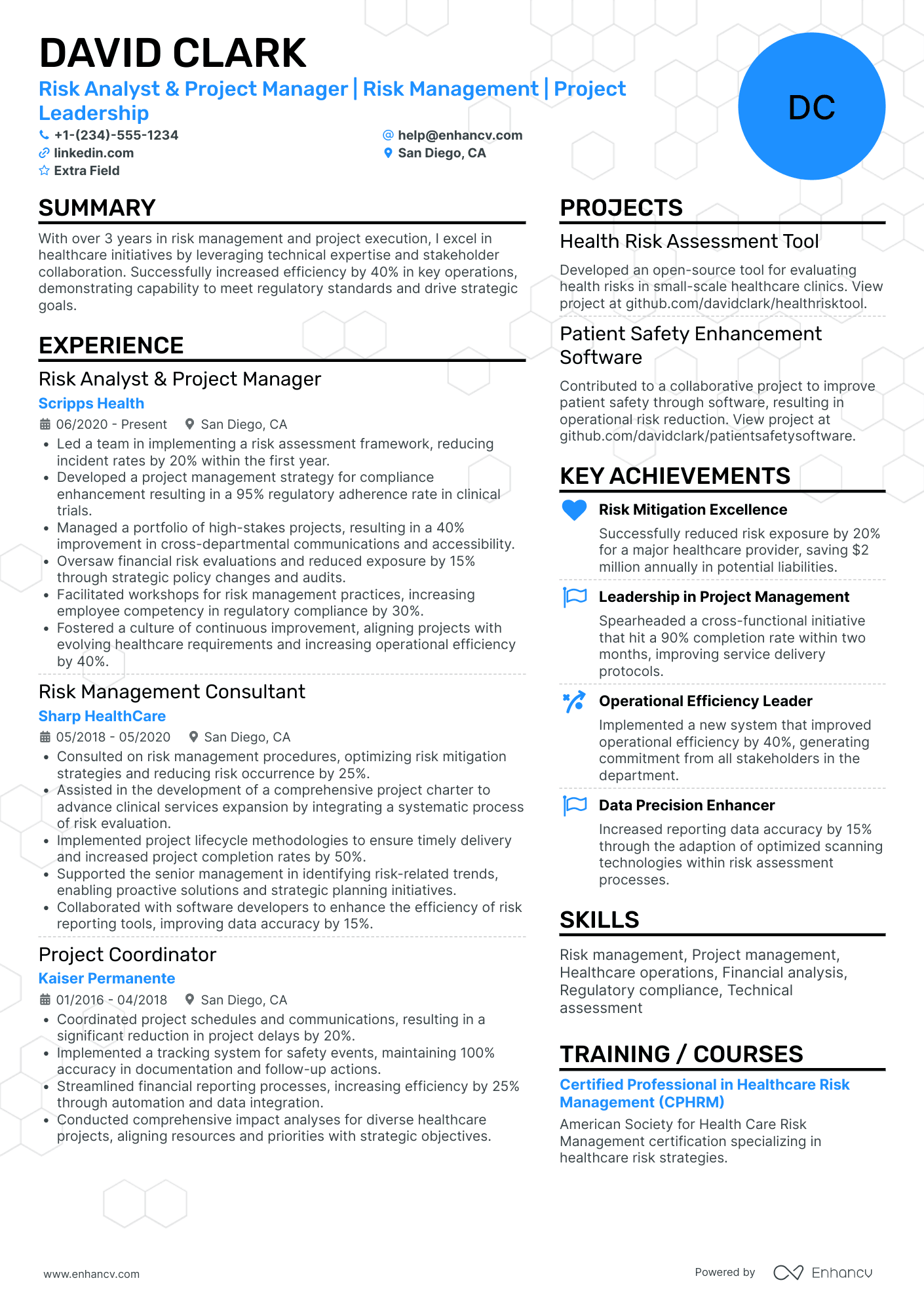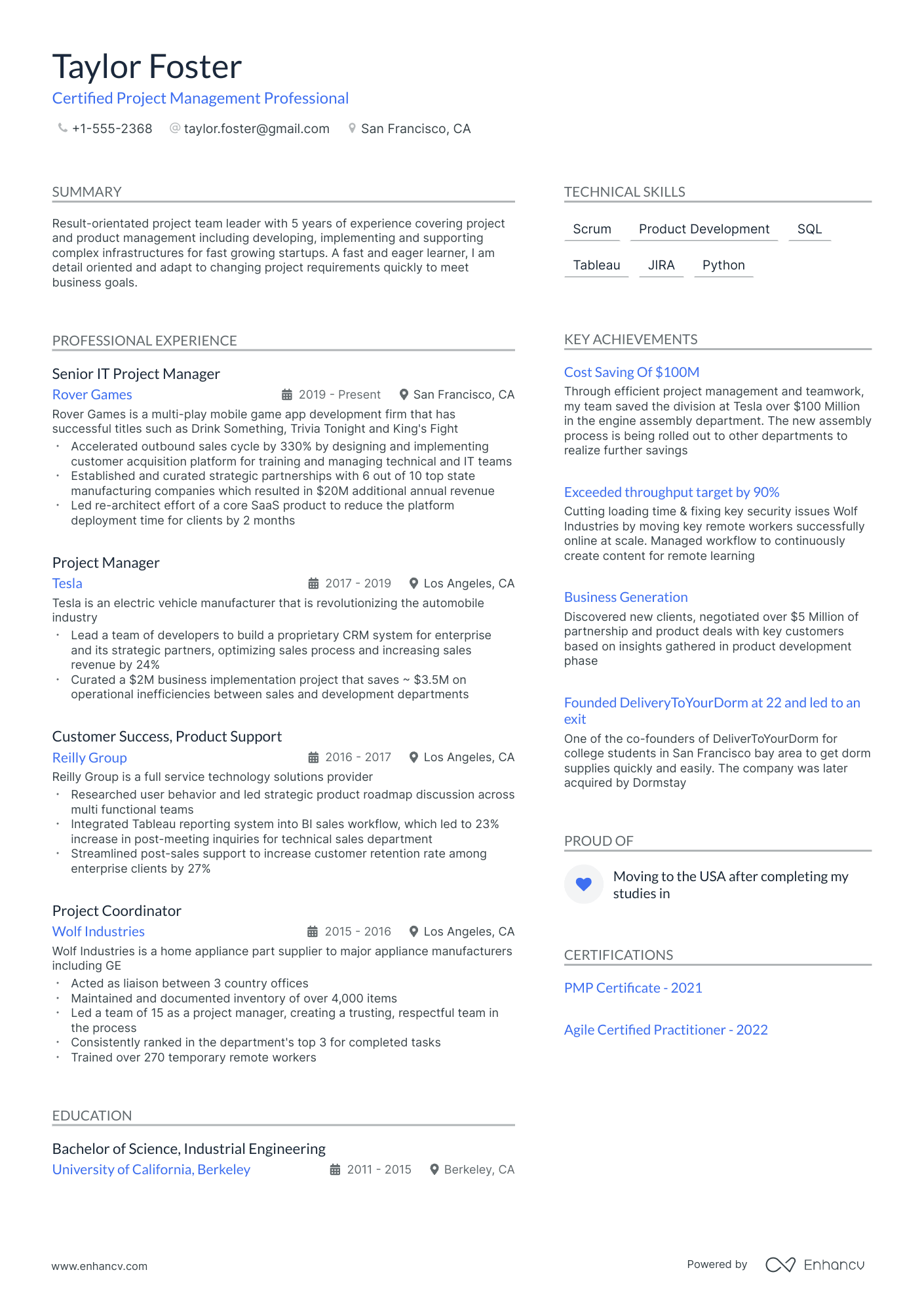Project managers need to have strong resumes – not only to stand out from other applicants but also to show their experience and accomplishments in a manner that shows recruiters quantifiable achievements.
See, as a project manager, you play a key role in ensuring projects are completed on time, within budget, and to the required quality standards. Furthermore, you are responsible for planning, organizing, and overseeing the work of a team to achieve specific goals and objectives.
This is a huge investment for any business, and it’s the reason why recruiters evaluate all project manager applications with scientific accuracy. Including yours.
Let’s see what you’ll learn here:
- Begin with a project manager resume example to understand the layout and essential information.
- How to list your skills in managing projects, leading teams, and meeting deadlines.
- How to share examples of successful projects you've led, highlighting budget management and problem-solving.
- How to phrase specific parts of your resume, e.g. how you coordinate with different departments and stakeholders to ensure project success.
If you’re specializing in a specific field of project management, we’ve got guides that cover it all:
- Program manager resume
- Program analyst resume
- Project analyst resume
- Scrum master resume
- Product manager resume
- Operations manager resume
- Systems analyst resume
- Change management resume
- Management resume
- IT manager resume
- IT project manager resume
Project manager resume example
Here's what this applicant does well in their resume:
- Quantifiable achievements: Demonstrates impact with specific, measurable results, such as increasing sales revenue by 24% at Tesla and improving outbound sales cycle by 330% at Rover Games.
- Professional progression: Shows a clear career trajectory from Project Coordinator to Senior IT project manager, underscoring increasing responsibility and expertise.
- Technical skills and certifications: Lists relevant technical skills and certifications like PMP and Agile Certified Practitioner, aligning with the demands of project management roles.
- Key achievements section: Highlights significant accomplishments, like saving Tesla $100M, which adds credibility and draws attention to major successes.
How to format a project manager resume
A reverse-chronological resume format is a gold standard for resumes. The experience (listed from most recent to oldest), is going to be the centerpiece of your resume. This should be your first choice too.
Here are the most common resume layout elements to be aware of:
- Font family. Choose a professional font that looks good both on PDF and printed on paper. Our recommendations are Lato, Rubik, Arial, Calibri, Bitter, or the classic Times New Roman.
- Font size. The standard font size for resumes is 12p., but it can vary slightly between 10p and 14p so that you can fit your resume on a single page. Anything above or below will make it difficult to read.
- Color. Use color sparingly. We suggest using one base color for your content, and a secondary one for highlights, such as your section headings.
- Margins. Use a standard 1-inch. A smaller margin will make you want to cram too much unnecessary information.
- Length. Keep to a maximum of two pages. The rule of thumb is to go back up to 10 to 15 years of relevant experience.
- Create a resume header with your basic content information, including your phone number, a professional email address, your location, and a link to your professional LinkedIn profile. Don’t add a photo if you’re applying for a US or a UK company - it’s frowned upon.
- File format. Save your resume as a PDF, to preserve your formatting. Modern applicant tracking software can read them flawlessly.
Tailor your resume format to the job market – a Canadian resume, for example, might differ in layout.
If you’re wondering whether your resume format ticks all the ATS boxes, give our Resume Checker a spin:
Is your resume good enough?
Drop your resume here or choose a file. PDF & DOCX only. Max 2MB file size.
The top sections on a project manager resume:
- Contact information: Provides recruiters with necessary details to get in touch.
- Summary statement: Presents an overview of qualifications and expertise relevant to project management.
- Project management experience: Demonstrates your background in and knowledge of managing successful projects.
- Skills: Highlights your project management abilities - both soft and technical.
- Education and certifications: Proof of professional development, showcasing relevance to the project management field.
What recruiters want to see on your resume:
- Project execution history: Recruiters prioritize this to understand your experience in leading and managing projects from initiation to completion.
- Leadership skills: Essential for a project manager's role, recruiters look for this to ensure you can guide, motivate, and monitor a team effectively.
- Time management skills: Critical in meeting project deadlines, recruiters prioritize this to confirm your ability to allocate resources and time efficiently.
- Risk management skills: A key element in project management, recruiters value this to ensure you can identify, assess, and mitigate potential risks in a project.
- Certification in project management: Recruiters prioritize qualifications like PMP or Agile certificates, which are specifically relevant and demonstrate your proficiency in project management.
How to write your project manager resume experience
Use your resume experience section to prove exactly why you’re the right person for the job.
The experience section is less about efforts and more about accomplishments. HRs will hire people who have a track record to show it, and this is the place to do so. Here’s how to frame your experience:
- Use direct action verbs to highlight the work you achieved as a project manager.
- Feature relevant, strong project management skills that are most required in the job application.
- Include precise numbers and business results to showcase the value you provided.
- Tailor your resume to the job description. For example, if it uses terminology, such as “Prince2”, and what you use is “Prince 2”, or “Prince II”, chances are this mismatch will affect your ATS (applicant tracking system) score.
Now, let’s look at some practical examples.
- •Responsible for project management processes and procedures for contracted work.
- •Reviewed customer specifications and requirements for potential future product development.
- •Handled communicating with project progress and challenges to stakeholders.
- •Responsible for the reporting and documentation of all departmental activities.
Notice how shallow the example above is.
Although it shows some of the tasks you handle, it doesn’t highlight any of the results. It also includes basic job duties that any candidate can copy from resumes online.
That keeps you away from getting hired.
We’ll show you a better example of how you can improve your experience section.
Let’s make some simple tweaks.
- •Introduced an expense tracking strategy to stay within yearly budget goals which reduced business costs by $1.2M.
- •Developed strong cross-functional relationships with big clients and stakeholders across different levels of the business.
- •Lead monthly meetings with 8 project teams to identify challenges and resolve software development issues.
- •Conducted post product launch evaluation to identify successful software features and find ways to improve on them
The second example, on the other hand:
- Shows enough details about your past work.
- Demonstrates more metrics and examples, which enhances trust and shows credibility.
- It portrays you as a professional project manager who contributed a lot to the company.
Need more work experience section tips? Go through our guide here: How to Describe Your Work Experience on Resume.
How to quantify impact on your resume
You’ve heard many times that quantifying your achievements makes it easier for hiring managers to evaluate your performance in previous companies. To kick off your brainstorming process, let’s look at a few work situations in project management that you can use to show numbers in your resume:
- Include the number of projects you've managed: This demonstrates the breadth of your experience and your hands-on expertise.
- List the sizes of teams you have led: Showing the number of people you've managed can indicate your leadership and coordination skills.
- Mention the budgets you have handled: This reflects your ability to manage resources, which is key for any business.
- Detail the percentage by which you've completed projects under budget: This showcases your financial management skills, and how you save resources.
- State the average percentage of projects delivered on time: On-time project delivery is crucial and this shows respect towards deadlines and efficiency in project execution.
- Quantify the overall project performance improvement under your management: This can help demonstrate your value-add in improving operational effectiveness.
- Provide the number of risk assessments performed or handled: This indicates your active involvement in risk management, a critical aspect of project management.
- Include the number of successful stakeholder negotiations: Demonstrating your skills in managing stakeholder expectations can indicate your communication and negotiation abilities.
How do I write a project manager resume with no experience
Let's be honest here for a second:
Having experience is a plus to your resume. It makes hiring managers more confident in recruiting you.
But, HRs understand well that job success isn't only about experience. Many attributes can make a difference in an applicant.
Here's the deal:
The hiring company is looking for an entry-level project manager to handle specific tasks. You'll be able to find more details about that in the job application. Here’s how to build your resume:
- Read the job description, identify those duties, and prepare to include them in your resume.
- Feature the specific skills you have that allow you to perform those tasks.
- Support that with your educational background and unique certificates.
We'll teach you in the rest of this guide how you can do all that. Learn how to read a job description and extract the main resume keywords in this guide.
How to list your hard skills and soft skills on your resume
Since project managers cover a wide field of responsibilities, it doesn't help to list a handful of skills that are of the same nature.
You must pick the most relevant skills for the position you're applying to. Then use them to show that you can guarantee objectives, ensure quality, mitigate risk, etc.
14 technical skills on a project manager resume
- Project development
- Project Management Software
- Budgeting
- Project Schedule
- Data processing
- Microsoft Office: Word, MS Excel, Project, PowerPoint
- Visio
- ProjectLink
- Oracle Project Accounting
- Clarity
- ServiceNow
- Project Management Tools
- Risk Management
- Waterfall
- Scrum
- Project Deployment
As you may have noticed, these technical skills are specific to the job duties of any project manager.
Of course, you shouldn’t list them all in your resume.
Identify which skills are most required for the job you’re applying to by reading the job description carefully.
17 important soft skills to include in your resume for a project manager job
- Leadership skills
- Negotiation
- Communication Skills
- Critical Thinking
- Strategic project planning & Project scope
- Multitasking
- Detail-oriented
- Analytical skills
- Team management
- Customer Focus
- Interpersonal Skills
- Business Analysis
- Decision-Making
- Problem-Solving
- Resource Allocation
- Vendors Management
- Compliance
- Project Budgeting
These skills are a must-have for any applicant that’s serious about getting hired. But don’t limit yourself to the skills section for them.
The best way to showcase your soft skills is in other parts of your resume.
For example, you can include them within your experience section. Or list your skills in your summary section to capture the HR’s interest.
Also, don’t lean too hard on buzzwords. If you decide to use buzzwords in your project manager resume, make sure to use them in the right context and in the right place.
How to list your certifications and education on your resume
Project management is a role that requires lots of human interaction, flexibility, and creativity.
And you don’t learn this anywhere in school.
So you might ask:
Why do I need to include an education section in my resume anyway?
Think of it this way:
If you’re the hiring manager and had to cut a list from 1000s of candidates down to a dozen ones, what would your criteria be?
You’ll now focus on the secondary features of the applicants.
You want to hire someone who has all that, plus some relevant educational background.
Your resume needs an education section. Of course, you won’t detail everything you learned since primary school. In fact, you’ll do the exact opposite.
You’ll list your highest school degree, the university or college you went to, and the duration you spent there.
Check out this example:
All in all, the required degree depends on the industry the hiring company operates in.
Most often, those companies ask for a Bachelor’s in management or business. But sometimes they only hire candidates from technical fields such as computer science and IT.
It doesn't matter how strong your resume is. Featuring certifications in project management on a resume is always a plus.
It shows that you've invested lots of time to boost your career and learn new skills. And it also proves that you're experienced in your work.
But the most important thing is this:
It makes the hiring decision easier on recruiters and allows them to feel good about their choices.
Because...
If lots of trusted organizations are vouching for a candidate, it's a good thing to trust their judgment.
So:
What are the best project management certificates to feature on your resume?
Top 10 certificates for your resume
Project management and PMP from PMI – the gist of it
Let’s do a blitz round of the hottest questions about whether a PMP certification is worth the money or not.
Is PMP certification still relevant today?
Yes, there’s a growing demand for certified project managers. The demand for project managers is likely to continue to grow as organizations increasingly rely on project-based work to achieve their goals.
Can a PMP certificate increase my salary?
According to the Project Management Institute (PMI), the median annual salary for non-certified project managers in the United States is $93,000. On the other hand, Project Management Professionals (PMPs), who are certified by PMI, earn a median wage of $123,000 per year, which is a 32% increase compared to their non-certified colleagues.
Should I invest in a master's degree or PMP?
A PMP certification is considered superior to a Master's degree in Project Management. This is because a PMP certification requires at least 7,500 hours of hands-on experience leading and directing projects, as well as an objectively assessed level of theoretical knowledge. In comparison, a Master's degree in Project Management is focused primarily on theoretical knowledge and may not provide the same level of practical experience.
How to write your project manager resume summary or objective
Not sure what the utility of a summary in a resume is? It’s meant to provide a quick overview of your career so that hiring managers can learn more about you at a glance.
Generally, you want to include:
- Most successful projects you worked on
- Strongest project management skills that allowed you to thrive in your past jobs
- Best results and accomplishments you achieved in your career
- Types of projects you were responsible for implementation
To take this a step further, you’ll:
- Include precise metrics to support your claims.
- Use short, direct sentences to keep HRs interested.
- Personalize it by including specific project management keywords, skills, and achievements.
Let’s take a look at some project management resume summaries.
This barely scratches the surface as to who the candidate is and what they’re up to. Instead, it makes them look too uninterested and lazy to update their resume.
Let’s make this better with a few simple changes.
This is a better summary, because:
- It contains precise numbers that serve as strong evidence of your competence.
- It’s more personalized and speaks directly to the hiring manager.
- It features real examples of what the candidate worked on and achieved in their past job.
Finally, the question begs…
Do you need a resume objective?
We say - you don’t. A project manager is usually an experienced candidate for whom a career objective won’t greatly help.
Optimize your resume summary and objective for ATS
Drop your resume here or choose a file.
PDF & DOCX only. Max 2MB file size.
Additional sections for a project manager resume
You feel you need to add more depth to your resume, but you keep repeating the same bullet points over and over again? Let’s look at some additional sections that can put your experience beyond just professional roles and settings:
- Languages: Demonstrates multilingual abilities, beneficial in global project teams and diverse work environments.
- Professional affiliations: Lists memberships in relevant organizations, indicating engagement with the professional community.
- Volunteer experience: Showcases leadership and teamwork skills in non-professional settings, reflecting personal values and work ethic.
- Awards and honors: Presents achievements and recognitions, underscoring excellence and dedication in the field.
- Publications: Includes articles or papers written, reflecting expertise and thought leadership in project management.
- Personal projects: Describes relevant personal or side projects, showing initiative and passion beyond professional work.
Key takeaways for making an outstanding project manager resume
- Read the job description carefully. Understand what the hiring company is looking for, then craft your resume accordingly
- Use your resume header to grab attention and prove your competence
- Highlight your greatest accomplishments throughout your resume to remind people of your worth
- Use your experience section to feature your relevant expertise in cross-functional teams, and strongest skills
- When faced with competition, add an education and certificates sections to stand out from other
Project Manager resume examples
By Experience
Senior Project Manager
Junior Project Manager
Entry Level Project Manager
- The career objective clearly states the candidate's career goals and relevant experience.
- The internship experiences provide specific examples of the candidate's relevant experience in the IT industry.
- The strengths and skills sections include specific examples of the candidate's soft and hard skills, providing evidence of their abilities in real-life situations.
Project Manager Trainee
Project Manager Director
By Role
Agile Project Manager
Assistant Project Manager
Associate Project Manager
Business Project Manager
Clinical Project Manager
Commercial Project Manager
Creative Project Manager
CRM Project Manager
Digital Project Manager
Electrical Project Manager
Engineering Project Manager
Event Project Manager
Financial Project Manager
Freelance Project Manager
Implementation Project Manager
Infrastructure Project Manager
SAP Project Manager
Software Project Manager
Technical Project Manager
Web Project Manager
Marketing Project Manager
- 10 years of work experience as a project manager in Agile teams
- Project Manager Professional Certification
- Bachelor degree in adjacent to project management industry
